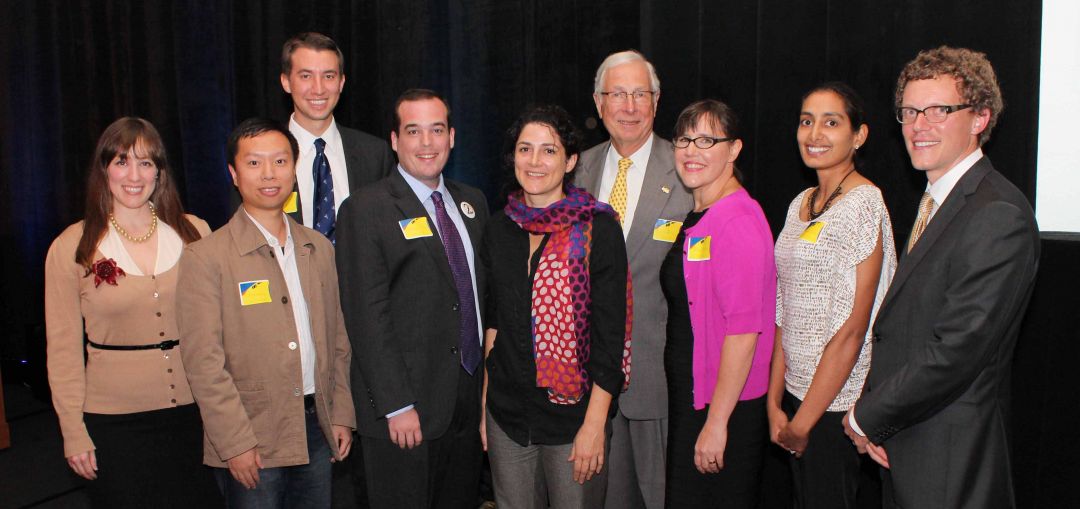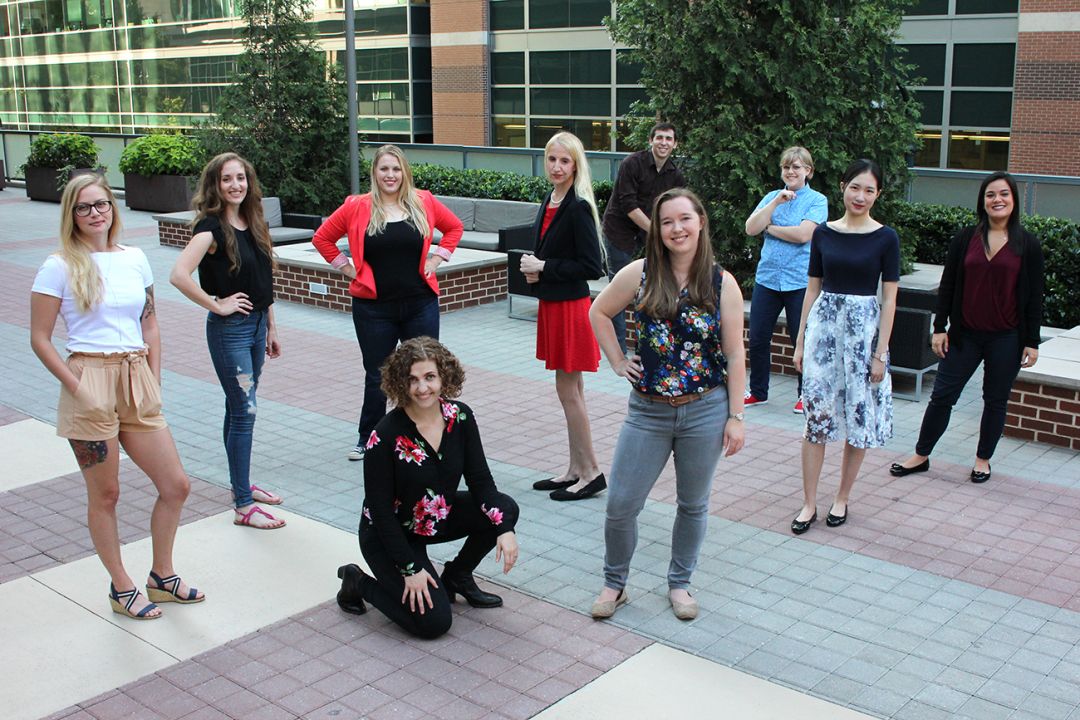As part of the GVU Center's 20th Anniversary Celebration, more than 100 alumni, donors and faculty celebrated the achievements of visionary student researchers at the annual Foley Scholars Dinner. Foley Scholar alumni joined the new honorees at the celebration, marking the fifth year of the Foley Scholarship, named in honor of GVU Center founder James D. Foley. Pictured (L to R): Kelly Caine (FS '08), Zhicheng "Leo" Liu (FS '11), Kurt Luther (FS '11), Andrew Miller (FS '13), Jill Fantauzzacoffin (FS '13), James Foley, Betsy DiSalvo (FS '10), Maithilee Kunda (FS '10), and Chris Le Dantec (FS '08).
"The Foley Scholarship Program recognizes the achievements of top graduate students whose personal vision and innovations in their research fields have the potential to shape how people interact with technology."
About the James D. Foley GVU Center Endowment
Giving to the Foley Endowment
2021 Foley Scholars and GVU Distinguished Master's Student

2020 Foley Scholars and GVU Distinguished Master's Student
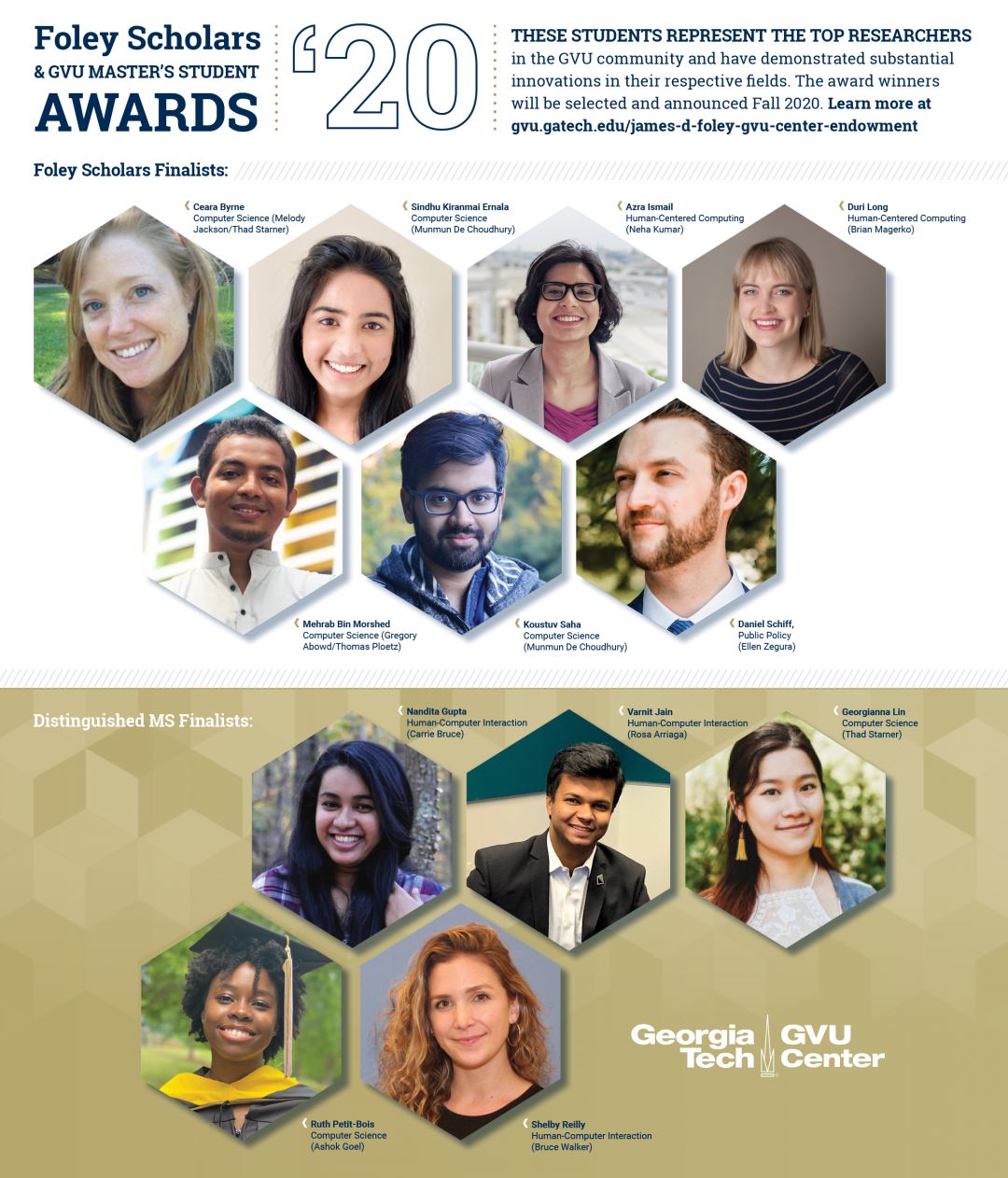
2019 Foley Scholars and GVU Distinguished Master's Student
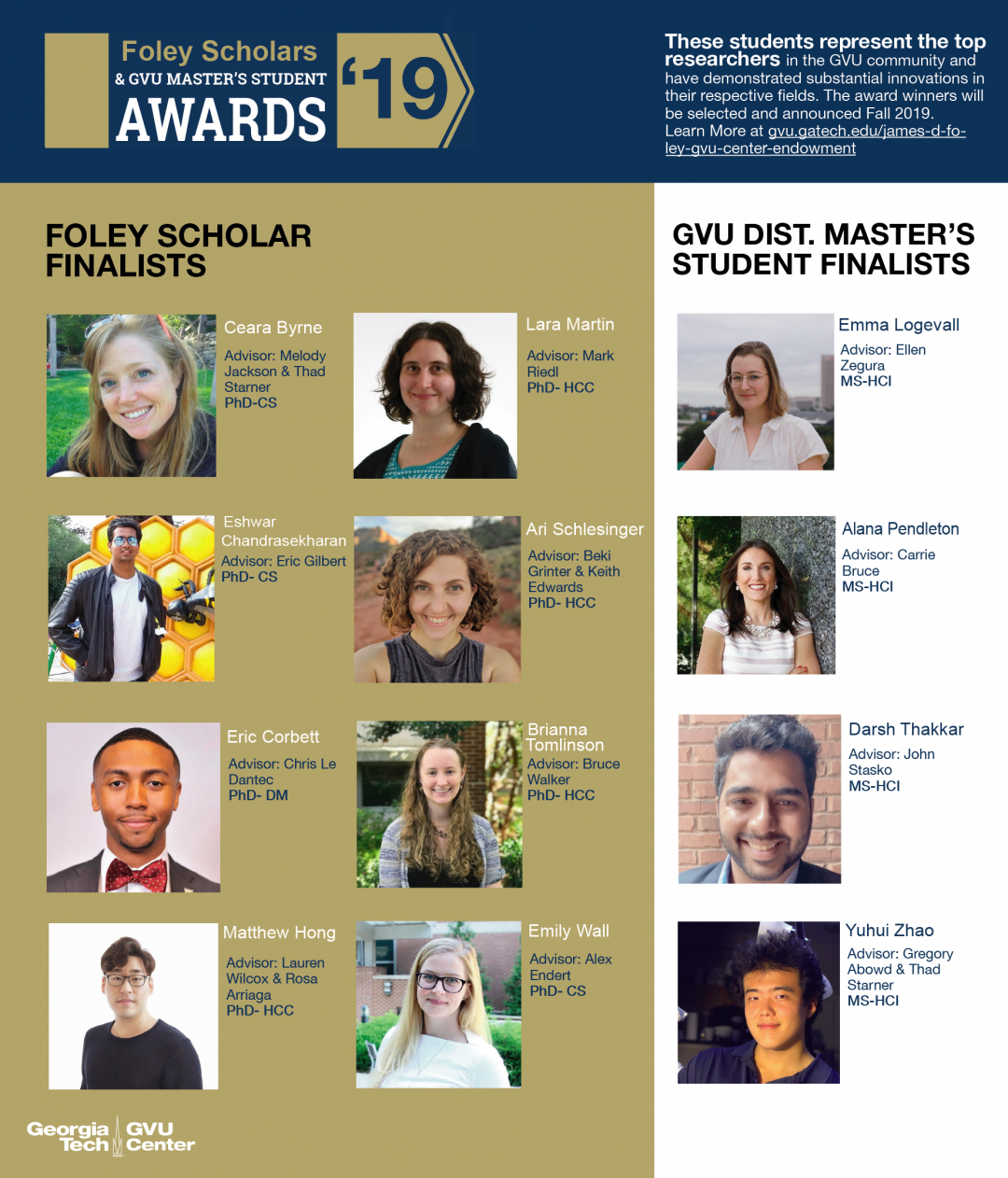
2018 Foley Scholars and GVU Distinguished Master's Student
Read about the award recipients and finalists in the 2018 awards program
View on Mobile
2017 Foley Scholars and GVU Distinguished Master's Student

(L to R): Kayla DesPortes, HCC Ph.D. student (adviser Betsy DiSalvo); Tesca Fitzgerald, CS Ph.D. student (advisers Ashok Goel and Andrea Thomaz); Tom Jenkins, DM Ph.D. student (adviser Carl DiSalvo); and Morgan Orangi, HCI MS student (adviser Carl DiSalvo).
Awardees and Finalists
Learn More about the four awardees and eight finalists
Foley Scholar Finalists 2017
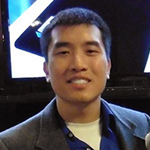 Dar-Wei Chen is a Ph.D. student in Engineering Psychology and is advised by Richard Catrambone. In the Problem Solving and Educational Technology laboratory, Chen focuses his research on designing instructional materials in ways that enable students to learn in durable and generalizable ways, especially in environments where a teacher might not be available. Rapidly-improving technologies have given many people the ability to summon any facts to their electronic devices from anywhere and at any time. Chen studies the unique pedagogical challenges this presents and how it will affect learning for the next generation of students. His dissertation examines “productive failure,” the hypothesis that students will learn more effectively when allowed to struggle and fail while problem-solving on their own before receiving canonical instruction. Studying PF instructional methods, Chen is examining how students perform relative to traditional “direct instruction” methods (those in which students receive canonical instructions first before completing practice problems). Chen will carry out a study in the domain of cryptarithmetic, a STEM-like domain that students might not have pre-existing familiarity with, and then replicate the study in the Rubik's Cube domain to find out whether the effectiveness of PF might change when students are engaging with material that is not as academic in nature. Chen hypothesizes that using PF methods will necessarily activate long-term and pre-existing knowledge when students are initially thrown “into the fire” of problem-solving without instruction first. The resulting connections between the old information and the learned material will help students retain the learned material for longer periods of time.
Dar-Wei Chen is a Ph.D. student in Engineering Psychology and is advised by Richard Catrambone. In the Problem Solving and Educational Technology laboratory, Chen focuses his research on designing instructional materials in ways that enable students to learn in durable and generalizable ways, especially in environments where a teacher might not be available. Rapidly-improving technologies have given many people the ability to summon any facts to their electronic devices from anywhere and at any time. Chen studies the unique pedagogical challenges this presents and how it will affect learning for the next generation of students. His dissertation examines “productive failure,” the hypothesis that students will learn more effectively when allowed to struggle and fail while problem-solving on their own before receiving canonical instruction. Studying PF instructional methods, Chen is examining how students perform relative to traditional “direct instruction” methods (those in which students receive canonical instructions first before completing practice problems). Chen will carry out a study in the domain of cryptarithmetic, a STEM-like domain that students might not have pre-existing familiarity with, and then replicate the study in the Rubik's Cube domain to find out whether the effectiveness of PF might change when students are engaging with material that is not as academic in nature. Chen hypothesizes that using PF methods will necessarily activate long-term and pre-existing knowledge when students are initially thrown “into the fire” of problem-solving without instruction first. The resulting connections between the old information and the learned material will help students retain the learned material for longer periods of time.
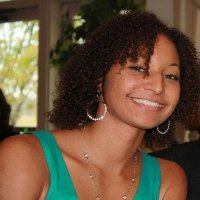 Kayla DesPortes is a Ph.D. student in Human-Centered Computing and is advised by Betsy DiSalvo. DesPortes' research is designed to change student apathy of computer science into deep-rooted engagement in the subject. She seeks to change how computing is regarded, so that students can understand and experience its interdisciplinary capabilities and feel confident that they can be producers rather than just consumers of the technology. She is also providing opportunities for a diversity of students to experience technology through enabling them to create with computing in ways they find personally valuable. Based upon the idea that personal values have a lasting impact on life choices, DesPortes' research introduces a new approach to the field of the learning sciences called “Value-driven Learning”. This approach focuses on creating a framework that engages students in iterative design, while scaffolding the students in reflecting on and integrating their values into the educational experience. Right now she has deployed two iterations of Value-driven Learning: the MoveLab in a one-week workshop and the Day of the Dead Interactive Puppets in five learning environments ranging from middle school to graduate school. The MoveLab involved middle and high school girls creating technology enhanced dance performances with dancers and engineers. The Day of the Dead project involved participants reflecting on someone that has passed away or something they have lost, and creating a computational object to represent that person or thing. An analysis has identified the promise of Value-driven Learning for creating inclusive and equitable learning environments in computing, across demographics.
Kayla DesPortes is a Ph.D. student in Human-Centered Computing and is advised by Betsy DiSalvo. DesPortes' research is designed to change student apathy of computer science into deep-rooted engagement in the subject. She seeks to change how computing is regarded, so that students can understand and experience its interdisciplinary capabilities and feel confident that they can be producers rather than just consumers of the technology. She is also providing opportunities for a diversity of students to experience technology through enabling them to create with computing in ways they find personally valuable. Based upon the idea that personal values have a lasting impact on life choices, DesPortes' research introduces a new approach to the field of the learning sciences called “Value-driven Learning”. This approach focuses on creating a framework that engages students in iterative design, while scaffolding the students in reflecting on and integrating their values into the educational experience. Right now she has deployed two iterations of Value-driven Learning: the MoveLab in a one-week workshop and the Day of the Dead Interactive Puppets in five learning environments ranging from middle school to graduate school. The MoveLab involved middle and high school girls creating technology enhanced dance performances with dancers and engineers. The Day of the Dead project involved participants reflecting on someone that has passed away or something they have lost, and creating a computational object to represent that person or thing. An analysis has identified the promise of Value-driven Learning for creating inclusive and equitable learning environments in computing, across demographics.
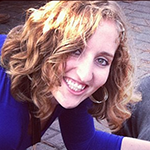 Michaelanne Dye is a Ph.D. student in Human-Centered Computing and is advised by Amy Bruckman and Neha Kumar. Dye's research aims to inform the responsible design of information-focused interventions for sustainable development. She does this by conducting work that incorporates the values of individuals at each step of the research process in order to contribute to a critical understanding of the ways users experience, appropriate, and alter information communication technologies (ICTs). This vision is at the core of Dye's dissertation research, which is focused on developing a holistic picture of internet access and use in Havana, Cuba. Up until recently, internet access in Cuba was limited to five percent of the population. In the absence of access to global networks of information, individuals have developed their own community-based, information networks. At the same time, policy in Cuba is changing and access to the internet is becoming more prevalent. Dye's work seeks to understand the particularity of each of these parts, and the bigger whole as it emerges during this time of transition. Through ethnographic research in Havana, she is exploring the ways diverse stakeholders actively and creatively stitch together multiple infrastructural commitments to co-create the “internet” in Cuba. Her work has examined how new internet access initiatives (like WiFi hotspots) and the use of social computing technologies (like Facebook) are impacting individuals in Havana and the local innovations that have emerged as a result. Building on previous and ongoing work, Dye's aim is to inform policy changes and future technological advancements in Cuba.
Michaelanne Dye is a Ph.D. student in Human-Centered Computing and is advised by Amy Bruckman and Neha Kumar. Dye's research aims to inform the responsible design of information-focused interventions for sustainable development. She does this by conducting work that incorporates the values of individuals at each step of the research process in order to contribute to a critical understanding of the ways users experience, appropriate, and alter information communication technologies (ICTs). This vision is at the core of Dye's dissertation research, which is focused on developing a holistic picture of internet access and use in Havana, Cuba. Up until recently, internet access in Cuba was limited to five percent of the population. In the absence of access to global networks of information, individuals have developed their own community-based, information networks. At the same time, policy in Cuba is changing and access to the internet is becoming more prevalent. Dye's work seeks to understand the particularity of each of these parts, and the bigger whole as it emerges during this time of transition. Through ethnographic research in Havana, she is exploring the ways diverse stakeholders actively and creatively stitch together multiple infrastructural commitments to co-create the “internet” in Cuba. Her work has examined how new internet access initiatives (like WiFi hotspots) and the use of social computing technologies (like Facebook) are impacting individuals in Havana and the local innovations that have emerged as a result. Building on previous and ongoing work, Dye's aim is to inform policy changes and future technological advancements in Cuba.
 Tesca Fitzgerald is a Ph.D. student in Computer Science and is advised by Ashok Goel and Andrea Thomaz. Fitzgerald is preparing now for a future where interactive robots are a part of everyday living, and she is doing so by designing robots to adapt to unpredictable environments in a similar manner as humans. Robot-learning algorithms do not exhibit the same type of creative problem-solving abilities as human learners. Even when an unfamiliar problem is related to one that it has previously encountered, a robot learner is unable to adapt the previous solutions to address the current scenario. Fitzgerald is researching how humans reason and acquire skills in order to transfer that knowledge to robot learners. Her research vision includes the goal of enabling robots to adapt to uncertainty in human environments and interact more closely with humans. By evaluating current theories of human cognition on a robotic platform that is capable of real-world action, perception, and interaction, Fitzgerald's research contributes to the communities of both cognitive science and human-robot interaction. Using the human cognition trait of adaptability, Fitzgerald is enabling a robot to (1) learn from a single demonstration of a task, and (2) seek assistance from a human teacher in order to repeat the task in a new environment. Fitzgerald has proposed a method that allows a robot to store demonstrations of tasks as individual experiences in memory, later recalling and adapting the most relevant experience to address a new problem. The goal is to use a case-based approach to enable task learning and adaptation using interactions across a range of scenarios.
Tesca Fitzgerald is a Ph.D. student in Computer Science and is advised by Ashok Goel and Andrea Thomaz. Fitzgerald is preparing now for a future where interactive robots are a part of everyday living, and she is doing so by designing robots to adapt to unpredictable environments in a similar manner as humans. Robot-learning algorithms do not exhibit the same type of creative problem-solving abilities as human learners. Even when an unfamiliar problem is related to one that it has previously encountered, a robot learner is unable to adapt the previous solutions to address the current scenario. Fitzgerald is researching how humans reason and acquire skills in order to transfer that knowledge to robot learners. Her research vision includes the goal of enabling robots to adapt to uncertainty in human environments and interact more closely with humans. By evaluating current theories of human cognition on a robotic platform that is capable of real-world action, perception, and interaction, Fitzgerald's research contributes to the communities of both cognitive science and human-robot interaction. Using the human cognition trait of adaptability, Fitzgerald is enabling a robot to (1) learn from a single demonstration of a task, and (2) seek assistance from a human teacher in order to repeat the task in a new environment. Fitzgerald has proposed a method that allows a robot to store demonstrations of tasks as individual experiences in memory, later recalling and adapting the most relevant experience to address a new problem. The goal is to use a case-based approach to enable task learning and adaptation using interactions across a range of scenarios.
 Matthew Guzdial is a Ph.D. student in Computer Science and is advised by Mark Riedl. Guzdial's research focuses on creative machine learning (ML) and stems in part from his perception of the failings in modern ML systems, which are able to replicate existing tasks, but are unable to generate classes that haven't been seen before. He seeks to discover creative solutions via machine learning, what he considers as one of the most pressing problems in the field and one that has great potential for broader impact. Guzdial's current research project focuses on automatic game generation trained on gameplay video. A video game represents a simplified version of reality with a consistent structure and an underlying physics system. The nature of physics-based games allows people to anticipate techniques developed in this research project that can be adapted or expanded to more and more complex domains such as scientific ideation and art generation. Guzdial makes use of novel machine learning techniques to model spatial and design elements and gameplay actions from gameplay video. Inspired by research in the graphics field, he developed a process based on automatic categorization to learn a model of level design. He's also tackled automated game understanding, which represents a new artificial intelligence challenge. This work resulted in Guzdial's AI being able to essentially “clone” a game engine from gameplay video and also use an AI agent to play through the game using the cloned engine. Guzdial is currently combining these various breakthroughs to achieve full automatic game generation.
Matthew Guzdial is a Ph.D. student in Computer Science and is advised by Mark Riedl. Guzdial's research focuses on creative machine learning (ML) and stems in part from his perception of the failings in modern ML systems, which are able to replicate existing tasks, but are unable to generate classes that haven't been seen before. He seeks to discover creative solutions via machine learning, what he considers as one of the most pressing problems in the field and one that has great potential for broader impact. Guzdial's current research project focuses on automatic game generation trained on gameplay video. A video game represents a simplified version of reality with a consistent structure and an underlying physics system. The nature of physics-based games allows people to anticipate techniques developed in this research project that can be adapted or expanded to more and more complex domains such as scientific ideation and art generation. Guzdial makes use of novel machine learning techniques to model spatial and design elements and gameplay actions from gameplay video. Inspired by research in the graphics field, he developed a process based on automatic categorization to learn a model of level design. He's also tackled automated game understanding, which represents a new artificial intelligence challenge. This work resulted in Guzdial's AI being able to essentially “clone” a game engine from gameplay video and also use an AI agent to play through the game using the cloned engine. Guzdial is currently combining these various breakthroughs to achieve full automatic game generation.
 Tom Jenkins is a Ph.D. student in Digital Media and is advised by Carl DiSalvo. For his dissertation, Jenkins is creating a design research project that uses an ecological approach to develop speculative Internet of Things devices for domestic outliers. This is an example of using research through design to explore designing for alternative social configurations and to understand the role technology might play in sustaining those arrangements. In particular, Jenkins is interested in how Internet of Things might operate as a technical practice and a system of objects inside of cohousing communities. Cohousing is an intentional community designed to operate like a village in an urban environment. Residents know their neighbors, own their own homes, and share ownership of a larger common house as well as the property that the community sits on. A “smart home” for cohousing provides a way to think about domestic IoT in a new way: it operates across multiple residences, but only one home. Jenkins' project explores what a social covenant might look like for IoT objects, platforms, or APIs in this environment. This research activity in cohousing offers a vantage point to critique contemporary IoT practices as well as provide a venue to design and build Internet of Things technologies from an ecological perspective. Design valences unique to cohousing, such as ideas of where the boundaries of “home” are, or what counts as public and private space, or how groups of more than 40 people could share technologies in their homes begin to reframe what future IoT systems might be like.
Tom Jenkins is a Ph.D. student in Digital Media and is advised by Carl DiSalvo. For his dissertation, Jenkins is creating a design research project that uses an ecological approach to develop speculative Internet of Things devices for domestic outliers. This is an example of using research through design to explore designing for alternative social configurations and to understand the role technology might play in sustaining those arrangements. In particular, Jenkins is interested in how Internet of Things might operate as a technical practice and a system of objects inside of cohousing communities. Cohousing is an intentional community designed to operate like a village in an urban environment. Residents know their neighbors, own their own homes, and share ownership of a larger common house as well as the property that the community sits on. A “smart home” for cohousing provides a way to think about domestic IoT in a new way: it operates across multiple residences, but only one home. Jenkins' project explores what a social covenant might look like for IoT objects, platforms, or APIs in this environment. This research activity in cohousing offers a vantage point to critique contemporary IoT practices as well as provide a venue to design and build Internet of Things technologies from an ecological perspective. Design valences unique to cohousing, such as ideas of where the boundaries of “home” are, or what counts as public and private space, or how groups of more than 40 people could share technologies in their homes begin to reframe what future IoT systems might be like.
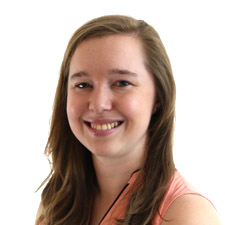 Miranda Parker is a Ph.D. student in Human-Centered Computing and is advised by Mark Guzdial. Parker's dissertation work explores the “intervening” variables between socioeconomic status (SES) and Computer Science (CS) achievement. Understanding more about the relationships among these variables could lead to a better understanding of the state of equity or inequity in computer science classrooms. Parker posits that SES could affect certain variables that in turn affect CS achievement. These intervening variables could be access to computing opportunities, perceptions of computer science, encouragement to pursue computer science, availability of toys that develop spatial reasoning skills, or a myriad of other variables that then give a student a better chance at achieving success in computer science. Parker is researching what the primary intervening variables are so that interventions can be made that improve those variables in order to give students a better opportunity to learn computer science. In a pilot study, she administered surveys to undergraduate students at Georgia Tech in their first computing course. Preliminary results show relationships between certain variables, but the impact of SES on CS achievement is hard to determine since students at Georgia Tech are fairly privileged, coming from medium- to high- SES, according to the study. Due to the lack of variance in the data set, Parker is expanding the study population to more institutions. The next steps focus on growing the results from the pilot study through qualitative methods, followed by a large-scale deployment of revised surveys to better quantify the relationship between the intervening variables, SES, and CS achievement.
Miranda Parker is a Ph.D. student in Human-Centered Computing and is advised by Mark Guzdial. Parker's dissertation work explores the “intervening” variables between socioeconomic status (SES) and Computer Science (CS) achievement. Understanding more about the relationships among these variables could lead to a better understanding of the state of equity or inequity in computer science classrooms. Parker posits that SES could affect certain variables that in turn affect CS achievement. These intervening variables could be access to computing opportunities, perceptions of computer science, encouragement to pursue computer science, availability of toys that develop spatial reasoning skills, or a myriad of other variables that then give a student a better chance at achieving success in computer science. Parker is researching what the primary intervening variables are so that interventions can be made that improve those variables in order to give students a better opportunity to learn computer science. In a pilot study, she administered surveys to undergraduate students at Georgia Tech in their first computing course. Preliminary results show relationships between certain variables, but the impact of SES on CS achievement is hard to determine since students at Georgia Tech are fairly privileged, coming from medium- to high- SES, according to the study. Due to the lack of variance in the data set, Parker is expanding the study population to more institutions. The next steps focus on growing the results from the pilot study through qualitative methods, followed by a large-scale deployment of revised surveys to better quantify the relationship between the intervening variables, SES, and CS achievement.
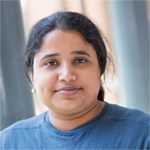 Umashanthi Pavalanathan is a Ph.D. student in Computer Science and is advised by Jacob Eisenstein. Pavalanathan's research includes studying factors that are shaping contemporary online writing, which is becoming increasingly distinct from other forms of written language. Such factors include the need to convey varied social meanings in online interpersonal interactions and the affordances made possible by technology-mediated channels. Pavalanathan's thesis project investigates this interplay through a series of large-scale studies of linguistic style variation in online writing using computational techniques from machine learning, natural language processing, and statistics, and theoretical constructs from sociolinguistics. Understanding the social dimensions of linguistic style variation in online writing has important consequences for the design of language technology and social computing systems, and beyond. Pavalanathan's thesis work broadly fits in the emerging research discipline called computational sociolinguistics, which integrates aspects of sociolinguistics and computer science in studying the relation between language and society from a computational perspective. The project focuses on five broad research questions related to the social aspects of linguistic style variation in online writing and is designed to advance the understanding of how individuals utilize the affordances in online social platforms and shift style to achieve varied social goals. Broadly, this type of computational sociolinguistics work will be a key towards creating socio-culturally aware artificial intelligence and socio-technical systems. Although this area is still new compared to other computational social science areas, there is an escalating interest in computational sociolinguistics and it puts Pavalanathan in a unique position to contribute to challenging work in an emerging interdisciplinary research area.
Umashanthi Pavalanathan is a Ph.D. student in Computer Science and is advised by Jacob Eisenstein. Pavalanathan's research includes studying factors that are shaping contemporary online writing, which is becoming increasingly distinct from other forms of written language. Such factors include the need to convey varied social meanings in online interpersonal interactions and the affordances made possible by technology-mediated channels. Pavalanathan's thesis project investigates this interplay through a series of large-scale studies of linguistic style variation in online writing using computational techniques from machine learning, natural language processing, and statistics, and theoretical constructs from sociolinguistics. Understanding the social dimensions of linguistic style variation in online writing has important consequences for the design of language technology and social computing systems, and beyond. Pavalanathan's thesis work broadly fits in the emerging research discipline called computational sociolinguistics, which integrates aspects of sociolinguistics and computer science in studying the relation between language and society from a computational perspective. The project focuses on five broad research questions related to the social aspects of linguistic style variation in online writing and is designed to advance the understanding of how individuals utilize the affordances in online social platforms and shift style to achieve varied social goals. Broadly, this type of computational sociolinguistics work will be a key towards creating socio-culturally aware artificial intelligence and socio-technical systems. Although this area is still new compared to other computational social science areas, there is an escalating interest in computational sociolinguistics and it puts Pavalanathan in a unique position to contribute to challenging work in an emerging interdisciplinary research area.
GVU Distinguished Master's Student Finalists 2017
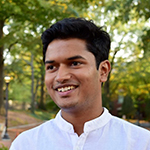 Vedant Das Swain is a MS-HCI student and is advised by Gregory Abowd. Das Swain is part of the CampusLife Project, a large scale multi-university project that started as the StudentLife Project in Dartmouth. The motivation behind the effort is to determine if mental health and academic performance could be correlated, or even predicted, through a student's digital footprint. Contextual data from students was captured through their interactions with mobile and wearable technology, social media and the environment itself in a month-long study. Das Swain is responsible for exploring, analyzing and testing the methods of acquiring the relevant type of experiential and contextual data specifically for large scale in-situ studies that are conducted remotely. His focus is on designing and validating methods that reliably and accurately obtain (and quantify) the markers that help identify the mental/emotional state of an individual; this includes mood, stress, self-esteem, etc. During the initial phase of his work, Das Swain navigated through the intricacies of polling various sensor data from a regular smartphone, ensuring the optimal use of smartphone resources to enable researchers to get the data they want without disrupting the daily phone usage of participants. He also is looking at the fundamental issue of how a participant's self-reported data translates to his or her mental state. Das Swain is focused on learning how to harness present day computing capabilities and everyday interactions to quantify the mental health of an individual better and affect positive behavior change.
Vedant Das Swain is a MS-HCI student and is advised by Gregory Abowd. Das Swain is part of the CampusLife Project, a large scale multi-university project that started as the StudentLife Project in Dartmouth. The motivation behind the effort is to determine if mental health and academic performance could be correlated, or even predicted, through a student's digital footprint. Contextual data from students was captured through their interactions with mobile and wearable technology, social media and the environment itself in a month-long study. Das Swain is responsible for exploring, analyzing and testing the methods of acquiring the relevant type of experiential and contextual data specifically for large scale in-situ studies that are conducted remotely. His focus is on designing and validating methods that reliably and accurately obtain (and quantify) the markers that help identify the mental/emotional state of an individual; this includes mood, stress, self-esteem, etc. During the initial phase of his work, Das Swain navigated through the intricacies of polling various sensor data from a regular smartphone, ensuring the optimal use of smartphone resources to enable researchers to get the data they want without disrupting the daily phone usage of participants. He also is looking at the fundamental issue of how a participant's self-reported data translates to his or her mental state. Das Swain is focused on learning how to harness present day computing capabilities and everyday interactions to quantify the mental health of an individual better and affect positive behavior change.
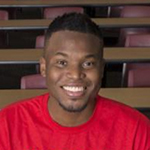 Kantwon Lamount Rogers is a MS-HCI student and is advised by Mark Guzdial. With computing a constant in daily life, Lamount Rogers sees an opportunity and need for people to be creators, not just consumers, of computing tech. Equipping people to learn computer science has had middling results, with low completion rates for massively open online courses (MOOCs) in the subject and little financial incentive for people who know computer science to teach it. Lamount Rogers' current research project, interactive electronic books (eBooks), aims to change this trend by producing higher completion rates than MOOCs and facilitating improved learning. The eBooks are designed to educate instructors who have no prior computer science knowledge and equip them with the content and pedagogical understanding needed to teach other students. Lamount Rogers' role in the project is analyzing log files of users to gain insight on how people are currently using the eBook and how it can be improved in the future. Most recently, teacher and student versions of an eBook were created for the College Board's Advanced Placement Computer Science Principles exam. A log file analysis by Lamount Rogers made design recommendations for creating different AP CS exam eBooks for novice (students) and expert (teachers) learners based on his findings that the two populations use the books and learn information differently. His personal research vision is to improve the participation and success of minority students in computer science and STEM. Teachers who work in school districts that cater to black and hispanic students often lack computer science knowledge and he hopes this project can offer opportunities to affect change in these districts.
Kantwon Lamount Rogers is a MS-HCI student and is advised by Mark Guzdial. With computing a constant in daily life, Lamount Rogers sees an opportunity and need for people to be creators, not just consumers, of computing tech. Equipping people to learn computer science has had middling results, with low completion rates for massively open online courses (MOOCs) in the subject and little financial incentive for people who know computer science to teach it. Lamount Rogers' current research project, interactive electronic books (eBooks), aims to change this trend by producing higher completion rates than MOOCs and facilitating improved learning. The eBooks are designed to educate instructors who have no prior computer science knowledge and equip them with the content and pedagogical understanding needed to teach other students. Lamount Rogers' role in the project is analyzing log files of users to gain insight on how people are currently using the eBook and how it can be improved in the future. Most recently, teacher and student versions of an eBook were created for the College Board's Advanced Placement Computer Science Principles exam. A log file analysis by Lamount Rogers made design recommendations for creating different AP CS exam eBooks for novice (students) and expert (teachers) learners based on his findings that the two populations use the books and learn information differently. His personal research vision is to improve the participation and success of minority students in computer science and STEM. Teachers who work in school districts that cater to black and hispanic students often lack computer science knowledge and he hopes this project can offer opportunities to affect change in these districts.
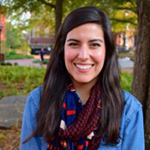 Morgan Orangi is a MS-HCI student and is advised by Carl DiSalvo. Orangi's personal research vision is one that encompasses community-building through technology. She desires to empower unique communities by introducing and integrating technology that enhances their sense of identity and methods of communication while also bringing awareness of these communities to an external audience. One project with Atlanta's Proctor Creek Stewardship Council resulted in a simulation that showed how stream pollution negatively affects Atlanta residents in low-income neighborhoods along urban streams. Another of her projects aims to enhance communication within and outside of Native American reservations through white space-enabled technologies. One goal is to expand internet access and optimize internet use in remote Native American communities, as well as understand how Native Americans produce content. As with many minority groups, Native Americans are under-represented and mis-represented in the media. With internet access, they have the opportunity to replace the current narrative with authentic depictions. Orangi's is seeking to determine what type of information the reservation residents consume, how they do so and their preference for sharing. These findings can then inform the design of a system or platform for their use. Orangi hopes to add to the research literature through surveys, interviews, diary studies, and participatory design activities with reservation residents. Existing research on reservations and new media has revealed the power of and gravitation towards social networking sites for community building and also revealed the importance of connecting physical and digital environments.
Morgan Orangi is a MS-HCI student and is advised by Carl DiSalvo. Orangi's personal research vision is one that encompasses community-building through technology. She desires to empower unique communities by introducing and integrating technology that enhances their sense of identity and methods of communication while also bringing awareness of these communities to an external audience. One project with Atlanta's Proctor Creek Stewardship Council resulted in a simulation that showed how stream pollution negatively affects Atlanta residents in low-income neighborhoods along urban streams. Another of her projects aims to enhance communication within and outside of Native American reservations through white space-enabled technologies. One goal is to expand internet access and optimize internet use in remote Native American communities, as well as understand how Native Americans produce content. As with many minority groups, Native Americans are under-represented and mis-represented in the media. With internet access, they have the opportunity to replace the current narrative with authentic depictions. Orangi's is seeking to determine what type of information the reservation residents consume, how they do so and their preference for sharing. These findings can then inform the design of a system or platform for their use. Orangi hopes to add to the research literature through surveys, interviews, diary studies, and participatory design activities with reservation residents. Existing research on reservations and new media has revealed the power of and gravitation towards social networking sites for community building and also revealed the importance of connecting physical and digital environments.
 Anandghan Waghmare is a MS-HCI student and is advised by Gregory Abowd. Waghmare envisions researching and designing new techniques for computer interaction that would better connect the physical world to the digital world and augment human abilities. By designing these systems to be always available, listening and analyzing the user's environment, they are more aware of the user's actions, and the interactions become serendipitous. Waghmare's work on SoundTrak and FingerSound are examples of this concept. SoundTrak augments any object to create a 3D interaction space around it with the use of microphones and a speaker. By wearing a ring mounted with a tiny speaker, the user can interact with any surface augmented with microphones which makes the interaction space larger and allows for more novel interactions. Another project, FingerSound, is a ring which tracks the user's finger while using the palm as a touch pad. FingerSound uses a ring on the thumb to detect unistroke gestures made against the palm. Input can be started virtually at any time and in any position without requiring the visual attention of the user to select each letter. Similarly, command gestures can be made without the need to look at the device or causing the user to feel around the physical environment blindly searching for an interface device. FingerSound allows all 26 letters and digits to be written by grazing the thumb across the fingers. Putting these technologies around or on the body allows for intuitive interaction between the body and the digital world and advances Waghmare's research vision of omnipresent computing.
Anandghan Waghmare is a MS-HCI student and is advised by Gregory Abowd. Waghmare envisions researching and designing new techniques for computer interaction that would better connect the physical world to the digital world and augment human abilities. By designing these systems to be always available, listening and analyzing the user's environment, they are more aware of the user's actions, and the interactions become serendipitous. Waghmare's work on SoundTrak and FingerSound are examples of this concept. SoundTrak augments any object to create a 3D interaction space around it with the use of microphones and a speaker. By wearing a ring mounted with a tiny speaker, the user can interact with any surface augmented with microphones which makes the interaction space larger and allows for more novel interactions. Another project, FingerSound, is a ring which tracks the user's finger while using the palm as a touch pad. FingerSound uses a ring on the thumb to detect unistroke gestures made against the palm. Input can be started virtually at any time and in any position without requiring the visual attention of the user to select each letter. Similarly, command gestures can be made without the need to look at the device or causing the user to feel around the physical environment blindly searching for an interface device. FingerSound allows all 26 letters and digits to be written by grazing the thumb across the fingers. Putting these technologies around or on the body allows for intuitive interaction between the body and the digital world and advances Waghmare's research vision of omnipresent computing.
Foley Scholars 2016
Special Coverage: Learn more about the 2016 Award Finalists and Recipients
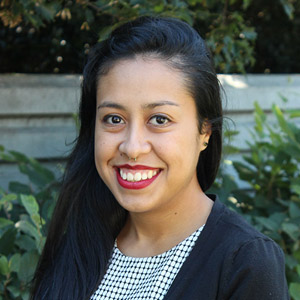
Mariam Asad is a Ph.D. student in Digital Media and is advised by Chris Le Dantec. Her work poses the question: “What would digital tools look like if they were designed for the values and goals of social justice communities?” Digitally supported advocacy, in its current form, might use a tool like Facebook to identify online spaces relevant to community residents (e.g. a neighborhood Facebook group), then promote a particular issue, like inviting them to an event (e.g. a canvassing training session) or asking them to 'like' a page (e.g. of an advocacy group). These mechanisms ask advocates to adjust their existing practices such that they can only be done while simultaneously supporting the goals of the corporation. The digital advocacy toolkit will include multiple levels of interactions to accommodate different kinds of social relationships, rather than basing online interactions on a single social relationship (i.e. a friendship). In addition to impacting local communities, Asad's project is also directly informed by them: she have conducted four years of ethnographic work with local Atlanta communities who do work on systemic social issues. This work spans multiple issues: Occupy Our Homes Atlanta is a housing justice group concerned with more equitable and sustainable housing and lending practices; Rise Up Georgia is a racial and economic justice group committed to empowering communities to be more politically engaged; and Sopo Bikes is a bike cooperative that encourages cyclists to learn to fix their own bikes.
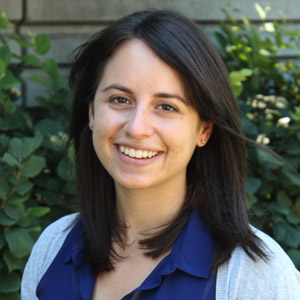 Maia Jacobs is a Ph.D. student in Human-Centered Computing and is advised by Beth Mynatt. Maia Jacobs explores how cancer affects many aspects of patients' daily lives and she is developing computational tools to help better manage the chronic illness. Cancer patients must manage a vast number of responsibilities placed on them after a cancer diagnosis, such as finding information about their diagnosis and treatment options, making treatment decisions, managing the additional financial burden, and coping with physical and emotional impacts of the disease. Without proper management, health outcomes and survival rates for cancer patients is impacted negatively. Jacobs is developing and assessing MyPath, a mobile application that offers personal assistance to breast cancer patients, recognizing that each journey is unique and constantly changing. The application provides patients with resources that are tailored to their specific needs. The application continuously adapts, updating the resource recommendations as patients' progress through treatment and their needs and goals change. This work is motivated by the fact that an overwhelming number of resources exist for cancer patients, yet finding trusted tools to support one's specific needs can be a difficult task that further compounds the responsibilities placed on individuals.
Maia Jacobs is a Ph.D. student in Human-Centered Computing and is advised by Beth Mynatt. Maia Jacobs explores how cancer affects many aspects of patients' daily lives and she is developing computational tools to help better manage the chronic illness. Cancer patients must manage a vast number of responsibilities placed on them after a cancer diagnosis, such as finding information about their diagnosis and treatment options, making treatment decisions, managing the additional financial burden, and coping with physical and emotional impacts of the disease. Without proper management, health outcomes and survival rates for cancer patients is impacted negatively. Jacobs is developing and assessing MyPath, a mobile application that offers personal assistance to breast cancer patients, recognizing that each journey is unique and constantly changing. The application provides patients with resources that are tailored to their specific needs. The application continuously adapts, updating the resource recommendations as patients' progress through treatment and their needs and goals change. This work is motivated by the fact that an overwhelming number of resources exist for cancer patients, yet finding trusted tools to support one's specific needs can be a difficult task that further compounds the responsibilities placed on individuals.
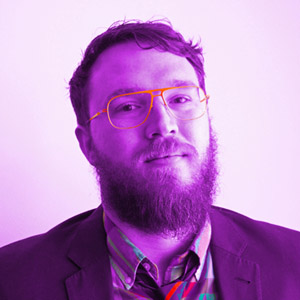 Clint Zeagler is a Ph.D. student in Human-Centered Computing and is advised by Melody Jackson. He is a designer and researcher of wearable technology and interested in how to create wearable technology that is both usable and useful. Making wearable technology usable involves empirical usability studies to show how a person might interact with technology on the body. Zeagler's previous work in textile based on-body interfaces is an example of the types of usability studies he has overseen. “Is it Gropable” was one such study about how well a person could interact with capacitive sensitive raised embroidered interfaces without visual attention. Other usability and technical material studies followed developing new textile interactions and testing the limitations of manufacturing materials and process. Building on the “Is it Gropable” study, Zeagler is currently developing a user study to test the combination of haptic stimulation with capacitive sensitive embroidery in the hopes of creating interfaces that use the body's proprioception more effectively, thus enabling easier use of wearable technology without visual attention.
Clint Zeagler is a Ph.D. student in Human-Centered Computing and is advised by Melody Jackson. He is a designer and researcher of wearable technology and interested in how to create wearable technology that is both usable and useful. Making wearable technology usable involves empirical usability studies to show how a person might interact with technology on the body. Zeagler's previous work in textile based on-body interfaces is an example of the types of usability studies he has overseen. “Is it Gropable” was one such study about how well a person could interact with capacitive sensitive raised embroidered interfaces without visual attention. Other usability and technical material studies followed developing new textile interactions and testing the limitations of manufacturing materials and process. Building on the “Is it Gropable” study, Zeagler is currently developing a user study to test the combination of haptic stimulation with capacitive sensitive embroidery in the hopes of creating interfaces that use the body's proprioception more effectively, thus enabling easier use of wearable technology without visual attention.
Foley Scholar Finalists 2016
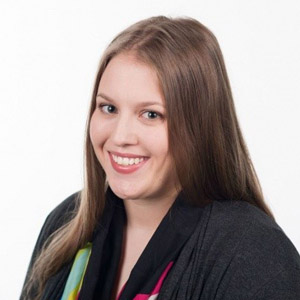 Stevie Chancellor is a Ph.D. student in Human-Centered Computing and is advised by Munmun De Choudhury. Chancellor studies mental wellness communities on social media platforms, where contentious interactions characterize some of the online discourse. Users in these communities are often seeking support and help; however, others promote dangerous lifestyle choices to cope with mental wellness challenges, like deliberate self-injury or disordered eating behaviors. As a doctoral student, Chancellor's research goal is to better understand these signals of mental wellness and develop automated computational approaches to understanding behavioral cues of risky communities from social media data. Her current project explores a small segment of this goal: to build a system to detect these behavioral cues on Tumblr data. Since starting at Georgia Tech, her research has focused on assessing the health and wellbeing of proeating disorder (proED) communities, a group that believes that eating disorders are an acceptable alternative lifestyle rather than a dangerous mental illness. Her projects and papers have examined community wellness after content moderation, trajectories of recovery after proED participation, and measuring mental illness severity.
Stevie Chancellor is a Ph.D. student in Human-Centered Computing and is advised by Munmun De Choudhury. Chancellor studies mental wellness communities on social media platforms, where contentious interactions characterize some of the online discourse. Users in these communities are often seeking support and help; however, others promote dangerous lifestyle choices to cope with mental wellness challenges, like deliberate self-injury or disordered eating behaviors. As a doctoral student, Chancellor's research goal is to better understand these signals of mental wellness and develop automated computational approaches to understanding behavioral cues of risky communities from social media data. Her current project explores a small segment of this goal: to build a system to detect these behavioral cues on Tumblr data. Since starting at Georgia Tech, her research has focused on assessing the health and wellbeing of proeating disorder (proED) communities, a group that believes that eating disorders are an acceptable alternative lifestyle rather than a dangerous mental illness. Her projects and papers have examined community wellness after content moderation, trajectories of recovery after proED participation, and measuring mental illness severity.
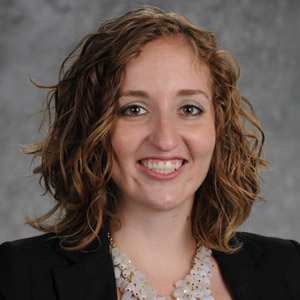 Michealanne Dye is a Ph.D. student in Human-Centered Computing and is advised by Amy Bruckman and Neha Kumar. Dye's research vision is one that aims to work alongside individuals in order to conduct work that incorporates their values and perspectives at each step of the process and illuminates issues that others have left unexplored. Currently, she is conducting a longitudinal study with Cuban nationals, exploring how increased access to online social networks affects the culture, perspectives, and relationships of this highly educated, yet historically isolated population. She has conducted in-depth interviews and online observations with participants from Cuba to explore access limitations, the activities they do online, and what Internet access means to them. Findings suggest that access limitations and slow network speeds greatly restrict Cubans' Internet use. Based on these findings and through a humancentered design process, Dye has built a crowdsourced information retrieval system (“Cuba Intercambio”) to help meet the information needs of her participants. She is continuing to work alongside participants in order to shape research around their values and assist in impacting positive results for the island population, either through design implications or informing the practices of companies that are hoping to engage more directly with Cuba.
Michealanne Dye is a Ph.D. student in Human-Centered Computing and is advised by Amy Bruckman and Neha Kumar. Dye's research vision is one that aims to work alongside individuals in order to conduct work that incorporates their values and perspectives at each step of the process and illuminates issues that others have left unexplored. Currently, she is conducting a longitudinal study with Cuban nationals, exploring how increased access to online social networks affects the culture, perspectives, and relationships of this highly educated, yet historically isolated population. She has conducted in-depth interviews and online observations with participants from Cuba to explore access limitations, the activities they do online, and what Internet access means to them. Findings suggest that access limitations and slow network speeds greatly restrict Cubans' Internet use. Based on these findings and through a humancentered design process, Dye has built a crowdsourced information retrieval system (“Cuba Intercambio”) to help meet the information needs of her participants. She is continuing to work alongside participants in order to shape research around their values and assist in impacting positive results for the island population, either through design implications or informing the practices of companies that are hoping to engage more directly with Cuba.
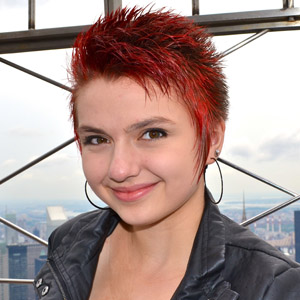 Tesca Fitzgerald is a Ph.D. student in Computer Science and is advised by Ashok Goel and Andrea Thomaz. Her research interests lie at the intersection of cognitive science and human-robot interaction. Fitzgerald is drawn to the complexity of human cognition and human decision-making, and how they can inspire new research developments in artificial intelligence. One such application of cognitively-inspired systems is in robotics; as robots become more commonplace, it will be necessary for robots to process their environment and solve problems with human-level ability. Fitzgerald is inspired by imitation learning in human cognition and seeks to enable imitation for a robotic agent such that, when provided with a single demonstration for completing a task, it can reuse the demonstration to address a related environment that differs in features such as the location, size, or appearance of objects. This is an example of “case-based” reasoning, which takes an existing, cognitively-inspired account for storing and reusing experiences individually in memory before addressing a new, unfamiliar problem. Fitzgerald adapts this method for use in imitation learning by having the robot store demonstrations of tasks as individual experiences in memory, the most relevant of which can be recalled to address a new problem.
Tesca Fitzgerald is a Ph.D. student in Computer Science and is advised by Ashok Goel and Andrea Thomaz. Her research interests lie at the intersection of cognitive science and human-robot interaction. Fitzgerald is drawn to the complexity of human cognition and human decision-making, and how they can inspire new research developments in artificial intelligence. One such application of cognitively-inspired systems is in robotics; as robots become more commonplace, it will be necessary for robots to process their environment and solve problems with human-level ability. Fitzgerald is inspired by imitation learning in human cognition and seeks to enable imitation for a robotic agent such that, when provided with a single demonstration for completing a task, it can reuse the demonstration to address a related environment that differs in features such as the location, size, or appearance of objects. This is an example of “case-based” reasoning, which takes an existing, cognitively-inspired account for storing and reusing experiences individually in memory before addressing a new, unfamiliar problem. Fitzgerald adapts this method for use in imitation learning by having the robot store demonstrations of tasks as individual experiences in memory, the most relevant of which can be recalled to address a new problem.
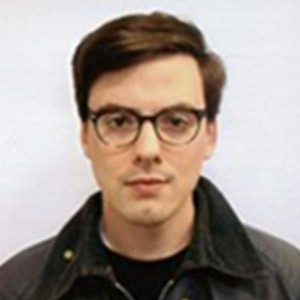 Tom Jenkins is a Ph.D. student in Digital Media and is advised by Carl DiSalvo. Jenkins applies research through design with a focus on electronic artifacts. Digital media technologies afford the creation of electronic prototypes that can materialize rhetoric, creating functionality that emphasize un- and under-scrutinized issues of practice by producing alternative systems that question assumptions around what values can should be built into devices. Jenkins is currently working on speculative design projects that probe the Internet of Things as it relates to alternative living situations, and in particular to cohousing communities. His thesis work provides a theoretical foundation for ecological design in order to create novel and useful design objects. It describes and classifies the contemporary Internet of Things in order to provide a springboard for design prototyping.
Tom Jenkins is a Ph.D. student in Digital Media and is advised by Carl DiSalvo. Jenkins applies research through design with a focus on electronic artifacts. Digital media technologies afford the creation of electronic prototypes that can materialize rhetoric, creating functionality that emphasize un- and under-scrutinized issues of practice by producing alternative systems that question assumptions around what values can should be built into devices. Jenkins is currently working on speculative design projects that probe the Internet of Things as it relates to alternative living situations, and in particular to cohousing communities. His thesis work provides a theoretical foundation for ecological design in order to create novel and useful design objects. It describes and classifies the contemporary Internet of Things in order to provide a springboard for design prototyping.
 Matthew Miller is a Ph.D. student in Aerospace Engineering and is advised by Karen Feigh. Miller's primary research goal is to develop and build a decision-support system (DSS) for use by astronauts who are working in environments where real-time communication is not possible, such as future missions to Mars. As NASA extends human presence into deep space, the time delay associated with communication relays between the flight crew and support crew will cause a shift from a real-time to an asynchronous communication environment. Asynchronous communication has been identified as an operational issue that must be addressed to ensure success for future space missions. Miller is identifying constraints in contemporary extravehicular activity (EVA) systems and defining the necessary requirements for a DSS to support an asynchronous EVA environment. This will allow him to build and test a DSS prototype and demonstrate his approach to a design framework that includes a human-system perspective for EVA missions.
Matthew Miller is a Ph.D. student in Aerospace Engineering and is advised by Karen Feigh. Miller's primary research goal is to develop and build a decision-support system (DSS) for use by astronauts who are working in environments where real-time communication is not possible, such as future missions to Mars. As NASA extends human presence into deep space, the time delay associated with communication relays between the flight crew and support crew will cause a shift from a real-time to an asynchronous communication environment. Asynchronous communication has been identified as an operational issue that must be addressed to ensure success for future space missions. Miller is identifying constraints in contemporary extravehicular activity (EVA) systems and defining the necessary requirements for a DSS to support an asynchronous EVA environment. This will allow him to build and test a DSS prototype and demonstrate his approach to a design framework that includes a human-system perspective for EVA missions.
GVU Distinguished Master's Student 2016
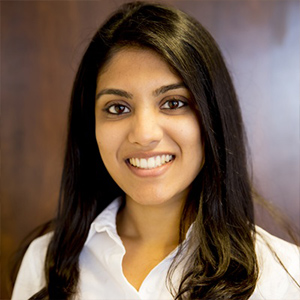 Samyukta Sherugar is a master's student in Human-Computer Interaction and is advised by Neha Kumar. Sherugar's research focuses on Information and Communication Technologies and Development (ICTD), and one of her projects involved working with an NGO in the Indian state of Gujarat to build community support for people with HIV/AIDS. While overseas, Sherugar helped the NGO design methods to increase the number of HIV people it could help. Shereugar explored the knowledge-sharing and technology practices of the outreach workers in order to quickly prototype possible design solutions and get feedback on what worked best. The experience in ethnographic research has made Sherugar a better researcher, she says, and also given her first-hand exposure to challenges and best practices in ICTD work.
Samyukta Sherugar is a master's student in Human-Computer Interaction and is advised by Neha Kumar. Sherugar's research focuses on Information and Communication Technologies and Development (ICTD), and one of her projects involved working with an NGO in the Indian state of Gujarat to build community support for people with HIV/AIDS. While overseas, Sherugar helped the NGO design methods to increase the number of HIV people it could help. Shereugar explored the knowledge-sharing and technology practices of the outreach workers in order to quickly prototype possible design solutions and get feedback on what worked best. The experience in ethnographic research has made Sherugar a better researcher, she says, and also given her first-hand exposure to challenges and best practices in ICTD work.
GVU Distinguished Master's Student Award Finalists 2016
 Yunnuo Cheng is a master's student in Human-Computer Interaction and is advised by Gregory Abowd. Cheng worked with Ph.D. student Caleb Southern on a project for driving behavior change, which aims to inform people about real driving cost by connecting an app built in the Georgia Tech Ubicomp Lab to the car's sensors. The project gauges how people might change their perception about their driving cost beyond fuel, such as ownership, insurance, and maintenance. The first round of the study focused on mindset-changing, and the next will study behavior change and its social impact. Cheng contributed on the user research part of the project, including literature review, experiment design, survey and interview design, data analysis plan design, and the pilot study.
Yunnuo Cheng is a master's student in Human-Computer Interaction and is advised by Gregory Abowd. Cheng worked with Ph.D. student Caleb Southern on a project for driving behavior change, which aims to inform people about real driving cost by connecting an app built in the Georgia Tech Ubicomp Lab to the car's sensors. The project gauges how people might change their perception about their driving cost beyond fuel, such as ownership, insurance, and maintenance. The first round of the study focused on mindset-changing, and the next will study behavior change and its social impact. Cheng contributed on the user research part of the project, including literature review, experiment design, survey and interview design, data analysis plan design, and the pilot study.
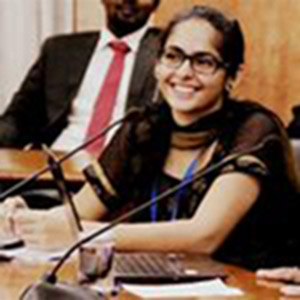 Aditi Dhar is a master's student in Human-Computer Interaction and is advised by Beth Mynatt. For Dhar, it is essential to do work that has the potential to impact communities in meaningful ways. In one project, she is involved in exploring the space of personal safety across borders and genders and ascertaining whether the proposed design intervention (a wearable device) is a probable solution. In other work, she is designing a tool that will make a significant difference for breast cancer patients and improve their quality of life. The project helps make the patients' treatment less overwhelming by building on their self- efficacy and empowering them with resources they need. Dhar is the UX designer on the project, which envisions aiding the entire journey of a breast cancer patient – from the very day of diagnosis up to survivorship.
Aditi Dhar is a master's student in Human-Computer Interaction and is advised by Beth Mynatt. For Dhar, it is essential to do work that has the potential to impact communities in meaningful ways. In one project, she is involved in exploring the space of personal safety across borders and genders and ascertaining whether the proposed design intervention (a wearable device) is a probable solution. In other work, she is designing a tool that will make a significant difference for breast cancer patients and improve their quality of life. The project helps make the patients' treatment less overwhelming by building on their self- efficacy and empowering them with resources they need. Dhar is the UX designer on the project, which envisions aiding the entire journey of a breast cancer patient – from the very day of diagnosis up to survivorship.
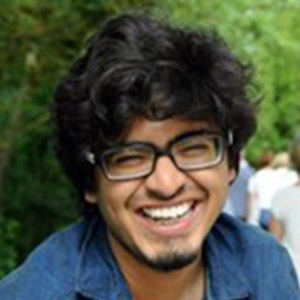 Sarthak Ghosh is a master's student in Human-Computer Interaction and is advised by Gregory Abowd. His research looks into the assistive nature of wearable computing, its unique attribute of being “always on,” and how to design wearables for social acceptance. Ghosh is investigating how accessible design can be integrated into the ways in which we interact with wearable devices. His current work is the development of new interaction techniques for smartwatches. “Whoosh” interaction tackles both the problems of touch and speech input, by allowing users to interact with non-speech acoustic cues. It supports touchless interactions on the smartwatch that are quick, ecological and unobtrusive. Non-speech vocal cues are also incorporated and are useful for people with speech impairment and for people with low hand-dexterity and coordination. The “Whoosh” techniques are a step toward Universal Interaction Design for wearables and one that Ghosh hopes will make the technology move toward the mainstream.
Sarthak Ghosh is a master's student in Human-Computer Interaction and is advised by Gregory Abowd. His research looks into the assistive nature of wearable computing, its unique attribute of being “always on,” and how to design wearables for social acceptance. Ghosh is investigating how accessible design can be integrated into the ways in which we interact with wearable devices. His current work is the development of new interaction techniques for smartwatches. “Whoosh” interaction tackles both the problems of touch and speech input, by allowing users to interact with non-speech acoustic cues. It supports touchless interactions on the smartwatch that are quick, ecological and unobtrusive. Non-speech vocal cues are also incorporated and are useful for people with speech impairment and for people with low hand-dexterity and coordination. The “Whoosh” techniques are a step toward Universal Interaction Design for wearables and one that Ghosh hopes will make the technology move toward the mainstream.
Foley Scholars 2015
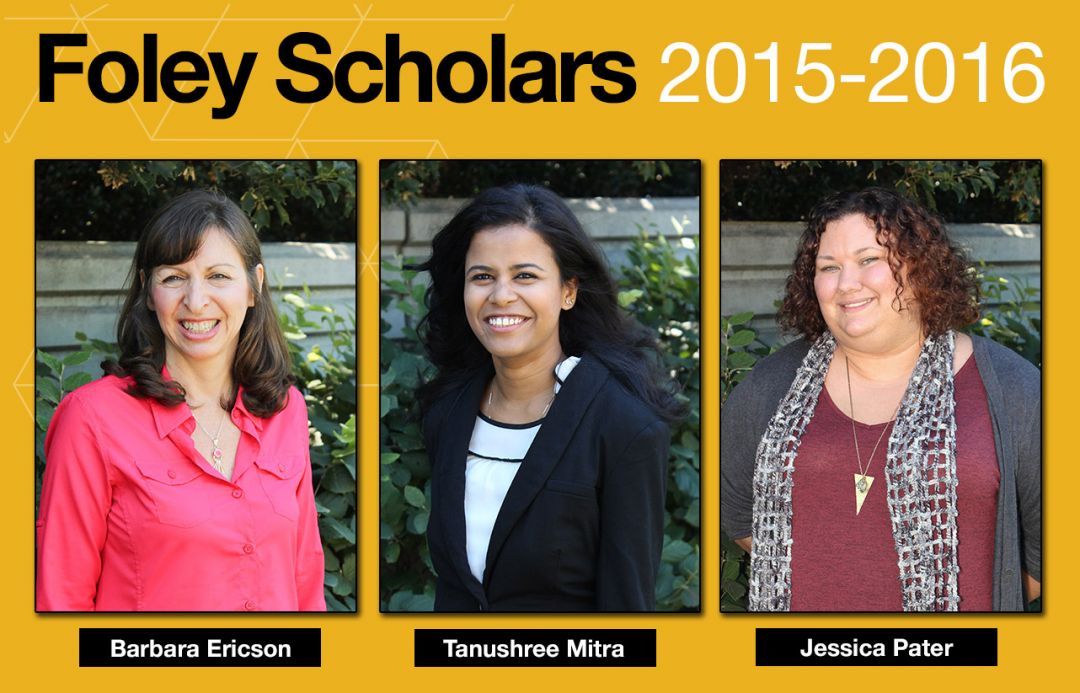
Congratulations to the 2015-2016 Foley Scholars Barbara Ericson, Tanushree Mitra and Jessica Pater.
Read about this year's entire class of graduate student superstars to find out where their work is taking them and for a peek at the ambitions they have in shaping the future of computing. Their work has already garnered them a unique distinction within GVU - they are the first all-woman group of Foley Finalists. The recipient of the first GVU Distinguished Master's Student Award, Monet Spells, is also a woman.
See the Scholars and Finalists at their finest and read about more of their work.
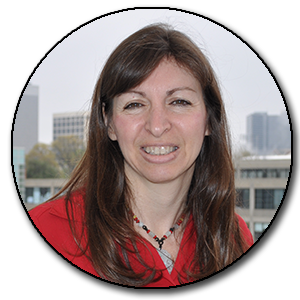 Barbara Ericson is a Ph.D. Candidate in Human-Centered Computing and is advised by Jim Foley. Ericson is helping to solve the challenge of how to prepare teachers to teach Advanced Placement Computer Science in order to increase computing proficiency among high schoolers. She is exploring using ebooks with reading groups to improve completion rates for those instructors teaching introductory computer science. Her work also explores applying findings from educational psychology to create interactive features that should improve learning outcomes. Ericson's focus is on Parsons problems, which are a type of low cognitive load practice problem and provide code segments that must be arranged in the correct order with the correct indention. Research on Parsons problems suggests that they might be a more effective and efficient learning approach than writing the equivalent code. She is seeking to develop adaptive Parsons problems, where the level of difficulty is adjusted based on user performance. Parsons problems are popular among users and creating new adaptive Parsons problems could have a substantial impact in teaching coding.
Barbara Ericson is a Ph.D. Candidate in Human-Centered Computing and is advised by Jim Foley. Ericson is helping to solve the challenge of how to prepare teachers to teach Advanced Placement Computer Science in order to increase computing proficiency among high schoolers. She is exploring using ebooks with reading groups to improve completion rates for those instructors teaching introductory computer science. Her work also explores applying findings from educational psychology to create interactive features that should improve learning outcomes. Ericson's focus is on Parsons problems, which are a type of low cognitive load practice problem and provide code segments that must be arranged in the correct order with the correct indention. Research on Parsons problems suggests that they might be a more effective and efficient learning approach than writing the equivalent code. She is seeking to develop adaptive Parsons problems, where the level of difficulty is adjusted based on user performance. Parsons problems are popular among users and creating new adaptive Parsons problems could have a substantial impact in teaching coding.
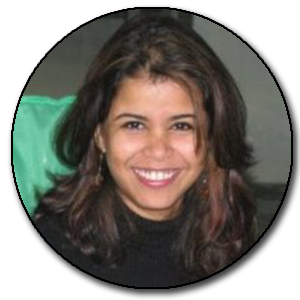 Tanushree Mitra is a Ph.D. Candidate in Computer Science and is advised by Eric Gilbert. Mitra's research agenda seeks to understand social media credibility, its implications in everyday life and the potential damaging effects of misinformation on these channels. Her most recent work is in building an iterative framework for tracking the credibility of social media information as it spreads. Prior work in this domain has primarily studied historically reported cases of rumors and lacks an understanding of how credibility evolves in real time. Her project goes beyond the “post-hoc analysis of popular rumors” and combines machine and human computation in an efficient way to track both less well-known and widespread instances of newsworthy content in real time. This is followed by crowd-sourcing credibility assessments of the information. Running the computing framework on Twitter, it has generated a corpus (CREDBANK) with newsworthy topics, their associated tweets and corresponding credibility scores. The next goal is to design prediction algorithms - an algorithm which can reasonably assess the credibility of an event. Mitra envisions her findings being able to inform the design of innovative tools that can tackle the economic and social risks associated with misinformation in social media.
Tanushree Mitra is a Ph.D. Candidate in Computer Science and is advised by Eric Gilbert. Mitra's research agenda seeks to understand social media credibility, its implications in everyday life and the potential damaging effects of misinformation on these channels. Her most recent work is in building an iterative framework for tracking the credibility of social media information as it spreads. Prior work in this domain has primarily studied historically reported cases of rumors and lacks an understanding of how credibility evolves in real time. Her project goes beyond the “post-hoc analysis of popular rumors” and combines machine and human computation in an efficient way to track both less well-known and widespread instances of newsworthy content in real time. This is followed by crowd-sourcing credibility assessments of the information. Running the computing framework on Twitter, it has generated a corpus (CREDBANK) with newsworthy topics, their associated tweets and corresponding credibility scores. The next goal is to design prediction algorithms - an algorithm which can reasonably assess the credibility of an event. Mitra envisions her findings being able to inform the design of innovative tools that can tackle the economic and social risks associated with misinformation in social media.
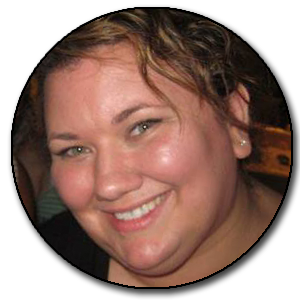 Jessica Pater is a Ph.D. Student in Human-Centered Computing advised by Beth Mynatt. Pater is examining the role and impact social media plays on self-injury behaviors, specifically eating disorders. Over a period of seven years, she has worked with adolescents and teens, developing an understanding of how and why they use technology and then translating that knowledge back into educational outreach for educators and parents. During this extended contact with teens and adolescents from the metro Atlanta area, she began uncovering harmful and powerful ways that teens use social media platforms to facilitate risky and questionable behavior. The current instantiation of diagnostic and screening tools for eating disorders and self-injury behaviors do not take into consideration the activities of an individual online, where negative reinforcements can be found. Pater's goal is to work with leading eating disorder clinicians to help inform the development of tools that better capture and incorporate these critical connections in online activity and eating disorders. Establishing this clinical connection has already begun with discussions with Children's Healthcare of Atlanta as well as the Renfrew Center's Atlanta clinic, a national leader in eating disorder treatment and recovery.
Jessica Pater is a Ph.D. Student in Human-Centered Computing advised by Beth Mynatt. Pater is examining the role and impact social media plays on self-injury behaviors, specifically eating disorders. Over a period of seven years, she has worked with adolescents and teens, developing an understanding of how and why they use technology and then translating that knowledge back into educational outreach for educators and parents. During this extended contact with teens and adolescents from the metro Atlanta area, she began uncovering harmful and powerful ways that teens use social media platforms to facilitate risky and questionable behavior. The current instantiation of diagnostic and screening tools for eating disorders and self-injury behaviors do not take into consideration the activities of an individual online, where negative reinforcements can be found. Pater's goal is to work with leading eating disorder clinicians to help inform the development of tools that better capture and incorporate these critical connections in online activity and eating disorders. Establishing this clinical connection has already begun with discussions with Children's Healthcare of Atlanta as well as the Renfrew Center's Atlanta clinic, a national leader in eating disorder treatment and recovery.

New for 2015-16, the GVU Distinguished Master's Student award is given to an MS student actively involved in a GVU-related research project. Each year, one student will be selected as the GVU Distinguished Master's Student Award winner; the award carries a $1,000 prize. Applicants must be entering the 2nd year (or later) of their Masters degree program as of each fall term, be in good standing with Georgia Tech, and be actively doing research with the GVU Center (e.g. working with GVU-affiliated faculty in GVU-related research areas). Applicants must be currently enrolled or on an internship at the time of application, and with an expectation to be enrolled at least throughout the following academic year. Citizens, permanent residents, and international students are eligible to apply.
Monet Spells, the first recipient of the award, is a MS student in Human-Computer Interaction and is advised by Betsy DiSalvo. Her personal research vision is to create pathways for other women of color to feel validated in the tech and computing space. She found an opportunity to extend this passion through an educational technology project called the MoveLab with Ph.D. HCC student Kayla DesPortes and DiSalvo in the Culture and Technology Lab. Spells planned the workshop activities, identified the qualitative research evaluation protocols, executed the workshop, and evaluated the workshop data.
The MoveLab was a five-day STEAM workshop investigating a community of learners as they embarked on a STEAM endeavor to create a technology-enhanced dance performance. The workshop participants included African American and Hispanic teenage girls in middle-school and high-school, dancers, choreographers, computer scientists, and engineers collaborating to develop the performance. Participants were introduced to a dance and engineering curriculum, microcontrollers, sensors, dance concepts, and choreography tools. Spells noticed during the workshop fundamental changes in the girls' interest and development with respect to technology. For example, after successfully assembling circuits and soldering boards, one student expressed an interest in taking a computer science course at her high school. Her successes in the space validated her curiosity to explore computer science in a formal environment.
Foley Scholar Finalists 2015
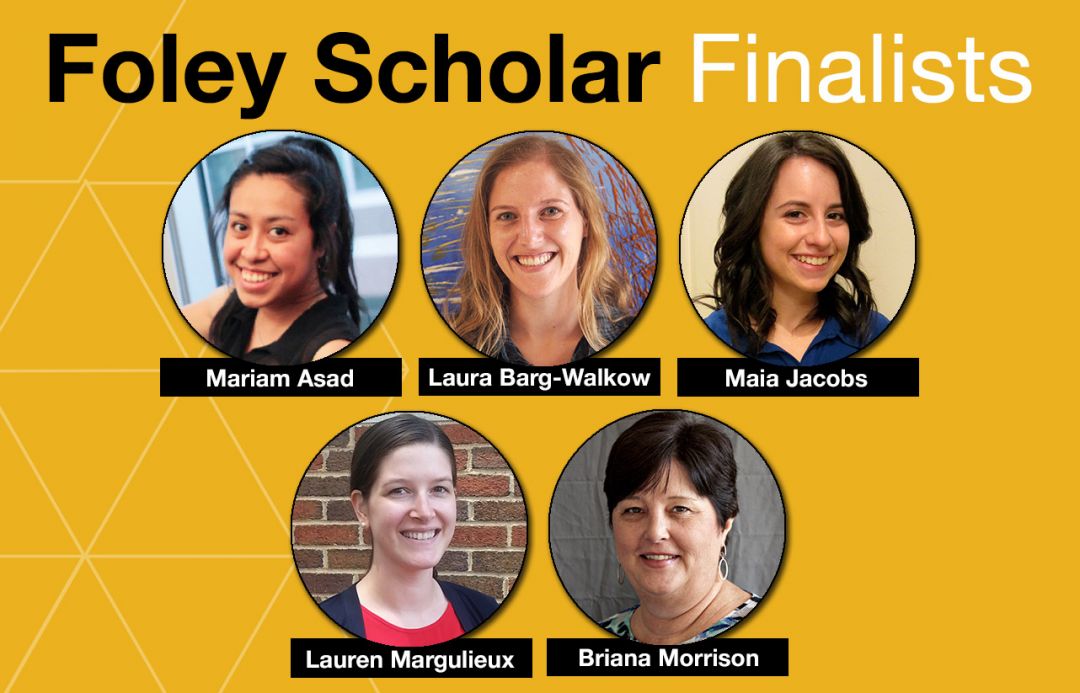
The GVU Center seeks top graduate students to help shape cutting edge research that is focused on how people can use computing technology in understanding and improving their daily lives.
The Foley Scholars program is the center's highest award for student excellence in research contributions to computing.
The GVU Center's 2015-2016 Foley Scholar Finalists were chosen from a talented and diverse group of applicants representing research programs from across Georgia Tech. Finalists were selected for their research vision and the potential impact of their work. Also, a new GVU Distinguished Master's Student Award was created to recognize excellence in research by master's students. These graduate students play critical roles in many of the labs and projects affiliated with GVU and are a valued part of the research community.
The Foley Scholarship includes a $5,000 award and gives students more visibility for their research and potential new collaborative opportunities. Now in its eighth year, the scholarship is supported by donor gifts to the James D. Foley GVU Center Endowment.
The endowment was started in honor of James D. Foley, a professor of Interactive Computing, pioneer in the field of Human-Computer Interaction, and a continuing influence in the lives and research of students and faculty in the GVU Center.
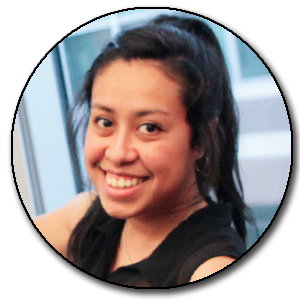 Mariam Asad is a Ph.D. Student in Digital Media and is advised by Christopher Le Dantec. Asad's current work is in the design and development of a digital advocacy toolkit. This work focuses on developing digital tools to address systemic social issues- like housing, transportation, or food access- using integrated, hybrid approaches to address a community's specific, contextual needs. Any one social issue is multi-faceted and complex with unique histories and contingencies, and solutions to these issues are similarly complex and cannot be found in any one domain.. Asad focuses on how to design digital interventions- tools, platforms, applications- to address various needs and influence political change and civic work. Her research draws on three years of ethnographic work with a local housing justice activist group working towards more equitable housing practices. The group used online tools to complement their offline civic work: e-conference call tools supported training sessions; mailing lists broadcasted fundraising efforts; and social media coordinated protect actions, like marches, vigils, or sit-ins. Asad is continuing to work with this group to design and implement tools to help support future civic work and empower local communities.
Mariam Asad is a Ph.D. Student in Digital Media and is advised by Christopher Le Dantec. Asad's current work is in the design and development of a digital advocacy toolkit. This work focuses on developing digital tools to address systemic social issues- like housing, transportation, or food access- using integrated, hybrid approaches to address a community's specific, contextual needs. Any one social issue is multi-faceted and complex with unique histories and contingencies, and solutions to these issues are similarly complex and cannot be found in any one domain.. Asad focuses on how to design digital interventions- tools, platforms, applications- to address various needs and influence political change and civic work. Her research draws on three years of ethnographic work with a local housing justice activist group working towards more equitable housing practices. The group used online tools to complement their offline civic work: e-conference call tools supported training sessions; mailing lists broadcasted fundraising efforts; and social media coordinated protect actions, like marches, vigils, or sit-ins. Asad is continuing to work with this group to design and implement tools to help support future civic work and empower local communities.
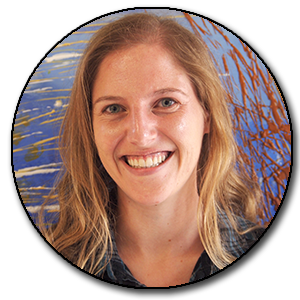 Laura Barg-Walkow is a Ph.D. Student in Engineering Psychology and is advised by Wendy Rogers. Barg-Walkow's primary research focus is on applications of engineering psychology for improving healthcare systems. She was worked on many projects in this area, ranging from understanding medical device use errors to researching health and wellness in an aging population. One such project was developing the System for Tracking and Managing Pain (STAMP), designed to improve pain management and shared medical decision-making through visualizing patterns of pain levels as they relate to factors affecting pain (e.g., exercise, mood). STAMP was tested with two user groups - older adults and health care providers - and was a multi-year collaboration between academia, industry, and a healthcare professional group. Barg-Walkow devised and conducted usability studies, conducted heuristic evaluations of the interface, and provided design recommendations for improving the software prototype of STAMP. She was involved in all aspects of this iterative process, from designing the method to user testing to demonstrating the system's potential efficacy.
Laura Barg-Walkow is a Ph.D. Student in Engineering Psychology and is advised by Wendy Rogers. Barg-Walkow's primary research focus is on applications of engineering psychology for improving healthcare systems. She was worked on many projects in this area, ranging from understanding medical device use errors to researching health and wellness in an aging population. One such project was developing the System for Tracking and Managing Pain (STAMP), designed to improve pain management and shared medical decision-making through visualizing patterns of pain levels as they relate to factors affecting pain (e.g., exercise, mood). STAMP was tested with two user groups - older adults and health care providers - and was a multi-year collaboration between academia, industry, and a healthcare professional group. Barg-Walkow devised and conducted usability studies, conducted heuristic evaluations of the interface, and provided design recommendations for improving the software prototype of STAMP. She was involved in all aspects of this iterative process, from designing the method to user testing to demonstrating the system's potential efficacy.
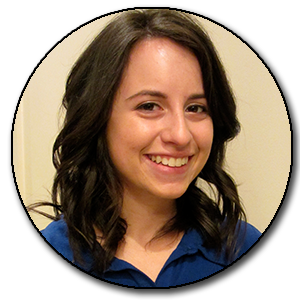 Maia Jacobs is a Ph.D student in Human-Centered Computing and is advised by Beth Mynatt. Jacobs is examining the real world benefits of personalized health tools for cancer patients by developing technology that reflects information about individual patients and provides customized support and resources to users. The aim of the research project is to study how to design appealing and usable personalized user experiences that help patients better manage chronic diseases. Developing personalized health tools presents significant challenges. The technology must possess the flexibility and robustness to cater to the full range of an individual patient's needs in order to make an overwhelming experience like being diagnosed with cancer manageable on a day-to-day basis. The technology must be able to adapt along with the patient, while maintaining an easy-to-use and engaging interface. Targeted help in the home could make a significant difference in supporting patients' individual needs and ultimately impacting health outcomes. For her study, Jacobs is designing tablets that will utilize an adaptive interface to present personalized support to breast cancer patients. The tablets will highlight new resources and make recommendations to patients based on data from health systems and patients themselves.
Maia Jacobs is a Ph.D student in Human-Centered Computing and is advised by Beth Mynatt. Jacobs is examining the real world benefits of personalized health tools for cancer patients by developing technology that reflects information about individual patients and provides customized support and resources to users. The aim of the research project is to study how to design appealing and usable personalized user experiences that help patients better manage chronic diseases. Developing personalized health tools presents significant challenges. The technology must possess the flexibility and robustness to cater to the full range of an individual patient's needs in order to make an overwhelming experience like being diagnosed with cancer manageable on a day-to-day basis. The technology must be able to adapt along with the patient, while maintaining an easy-to-use and engaging interface. Targeted help in the home could make a significant difference in supporting patients' individual needs and ultimately impacting health outcomes. For her study, Jacobs is designing tablets that will utilize an adaptive interface to present personalized support to breast cancer patients. The tablets will highlight new resources and make recommendations to patients based on data from health systems and patients themselves.
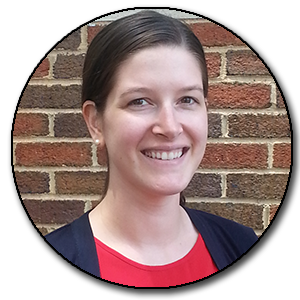 Lauren Margulieux is a Ph.D. Student in Engineering Psychology and is advised by Richard Catrambone. Margulieux's research interests center on supporting students in unsupervised learning environments through educational technology, especially in online courses in which students rely more on self-taught skills to be successful. In a recent study, she compared teaching methods used in face-to-face learning to those used in online learning to identify the teaching methods that are most effective in each environment. Then she analyzed learning outcomes from courses that mixed face-to-face and online learning together. These courses - typically called flipped, hybrid, or blended learning - have been defined by practitioners in different ways, preventing researchers and educators from aggregating research results in a meaningful way. Margulieux developed a taxonomy to better define and differentiate types of courses that mix face-to-face and online learning together. Using the taxonomy, she discovered trends in learning outcomes resulting from online learning. She found that providing feedback to students was crucial for improving learning outcomes when those students attempt to apply their knowledge and practice new skills. More specifically, when instructors provided this feedback, learning almost always improved, and when technology provided feedback, learning improved in half of the cases.
Lauren Margulieux is a Ph.D. Student in Engineering Psychology and is advised by Richard Catrambone. Margulieux's research interests center on supporting students in unsupervised learning environments through educational technology, especially in online courses in which students rely more on self-taught skills to be successful. In a recent study, she compared teaching methods used in face-to-face learning to those used in online learning to identify the teaching methods that are most effective in each environment. Then she analyzed learning outcomes from courses that mixed face-to-face and online learning together. These courses - typically called flipped, hybrid, or blended learning - have been defined by practitioners in different ways, preventing researchers and educators from aggregating research results in a meaningful way. Margulieux developed a taxonomy to better define and differentiate types of courses that mix face-to-face and online learning together. Using the taxonomy, she discovered trends in learning outcomes resulting from online learning. She found that providing feedback to students was crucial for improving learning outcomes when those students attempt to apply their knowledge and practice new skills. More specifically, when instructors provided this feedback, learning almost always improved, and when technology provided feedback, learning improved in half of the cases.
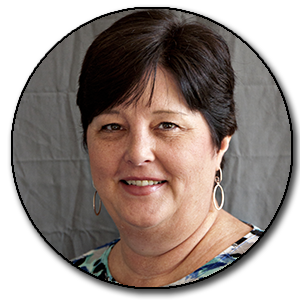 Briana Morrison is a Ph.D. Candidate in Human-Centered Computing and is advised by Mark Guzdial. Morrison is currently researching findings that indicate learning computer science is significantly different than other problem solving domains where certain educational psychology principles apply. Her work has shown that the overall cognitive load of learning programming is significantly higher than learning other STEM disciplines due to the nature of the material itself. Using a cognitive measurement tool that she developed, she can measure the intrinsic load component of learning to program. Establishing the fact of a high intrinsic cognitive load can positively impact other aspects of teaching programming – even how explanations of code are delivered to minimize the transience effect. The research would aid in furthering the development of instructional material specifically aimed at reducing the amount of intrinsic cognitive load imposed at one time on the learner. It can also decompose programming into simpler elements and develop specific practice style problems to aid all learners.
Briana Morrison is a Ph.D. Candidate in Human-Centered Computing and is advised by Mark Guzdial. Morrison is currently researching findings that indicate learning computer science is significantly different than other problem solving domains where certain educational psychology principles apply. Her work has shown that the overall cognitive load of learning programming is significantly higher than learning other STEM disciplines due to the nature of the material itself. Using a cognitive measurement tool that she developed, she can measure the intrinsic load component of learning to program. Establishing the fact of a high intrinsic cognitive load can positively impact other aspects of teaching programming – even how explanations of code are delivered to minimize the transience effect. The research would aid in furthering the development of instructional material specifically aimed at reducing the amount of intrinsic cognitive load imposed at one time on the learner. It can also decompose programming into simpler elements and develop specific practice style problems to aid all learners.
Foley Scholars 2014
Mason Bretan
Robotic and Human Musical Performances
Mason Bretan is a Ph.D. candidate in Music Technology and is advised by Gil Weinberg. His research focus is robotic musicianship, which includes developing systems that interact with humans through musical scenarios. Such systems include robots that play acoustic instruments, musical companion robots, and robotic prostheses for amputee musicians. Using sophisticated technology and artificial intelligence, Bretan enables these machines to respond to human creativity in meaningful ways and even inspire humans to be creative, ultimately leading to novel and interesting artistic experiences. This entails the creation of computational models describing aspects of music perception, improvisation, and interaction. A current project that encapsulates these goals is the development of a robotic prosthesis for an amputee drummer. There are two main objectives in this work: 1) provide the amputee with the drumming-specific functionalities he lost as a result of losing his arm and 2) create a semi-autonomous third arm that listens and responds to the drummer's play allowing for interesting music to emerge through a new and unique human-robotic interactive paradigm. Bretan designed the entire infrastructure for real-time low level control of the motors and higher-level commands such as simulated drum strikes.
Deana Brown
HCI for Immigrant and Refugee Populations
Deana Brown is a Ph.D. student in Human-Centered Computing and is advised by Beki Grinter. Brown designs, prototypes and studies social and ubiquitous technologies. Her research spans Social Computing, Human-Computer Interaction, Ubiquitious Computing, and Information and Communication Technologies for Development. Her work has been based in emerging markets within the Caribbean and Sub-Saharan Africa as well as within immigrant and refugee groups in the United States. As part of her work with these groups, Brown developed a collaborative tool called Rivrjam, accessible through a simple phone call or via a website, to mediate the exchange of voice and text messages sent between parents and their children's educators, tutors and academic mentors. The application stores, reroutes and (in the case of refugees) facilitates the translation of messages through the help of interpreters working at refugee agencies. As a first means of evaluating the tool's effectiveness, Brown deployed it at a public high school in Jamaica to support parent-school exchange with migrant parents living in the U.S. and U.K. The study found that it helped to improve the range of support an already active parent could provide to a child with increased knowledge of their needs and challenges.
Alex Zook
Artificial Intelligence for Games With a Purpose
Alex Zook is a Ph.D. Candidate in Human-Centered Computing and is advised by Mark Riedl. His research develops artificially intelligent (AI) systems to augment game design and development. While games are being used for an ever-broadening array of purposes - education and training, citizen science and data collection, or even health and social change - developing games remains a daunting challenge. Further, people making games (educators, scientists or health professionals) often lack the skills and time to create games. Zook has developed a system (now licensed to the Army Research Lab, Simulation and Training Technology Center) to automatically adapt game content to train players on their weakest skills using big data techniques. He has also developed systems to: (1) automate the time-consuming process of collecting data from human game players and tuning a game design to achieve a designer's objectives and (2) automate the process of defining game mechanics that ensure a game level or puzzle can be completed. Alex is currently working to integrate these methods into a system that automatically generates games for human-specified objectives and refines those games through tests with humans to optimize them for their design goals.
Foley Scholar Finalists 2014
Laura Barg-Walkow
Improving Healthcare Systems Through Medical Human Factors
Laura Barg-Walkow is a Ph.D. student in Engineering Psychology and is advised by Wendy Rogers. Her research interests include medical human factors, errors, and automation. Her interests are in applications for improving healthcare systems. She has worked on a number of projects centered on this goal, ranging from understanding medical device use errors to evaluating a hospital's redesigned triage system to researching health and wellness in an aging population. Her training in engineering psychology has provided her with the tools and methods to improve people's safety, performance, and satisfaction for interacting with systems through applying knowledge of human capabilities and limitations. Barg-Walkow received her Master of Science in Engineering Psychology from Georgia Tech in 2013.
Casey Fiesler
Understanding Web Communities and the Impact of Law in Online Creativity
Casey Fiesler is a Ph.D. candidate in Human-Centered Computing and is advised by Amy Bruckman. Armed with a law degree from Vanderbilt University Law School, she studies the intersection of technology and copyright law. Fiesler is particularly interested in how the law - and perceptions of the law - impact creativity online. Her dissertation work focuses on how ordinary Internet users make complex decisions about legal concepts that can baffle even lawyers, and she has studied social norms in communities of remixers and common misconceptions about Terms of Service. Along with her law degree, she holds an master's degree in Human-Computer Interaction and a bachelor's degree in Psychology from Georgia Tech. Also interested in copyright advocacy, she has interned for Creative Commons and sits on the legal committee for the Organization for Transformative Works.
Hwajung Hong
Autism Support Technologies to Help Navigate Everyday Life
Hwajung Hong is a Ph.D. student in Human-Centered Computing and is advised by Gregory Abowd and Rosa Arriaga. Her research interests lie in the area of Human-Computer Interaction (HCI), Design, and Social Computing. Hong's research combines social science, design and computational techniques to support individuals with special needs. She has extensive experience performing research that bridges computer science and social wellbeing of an underserved community. Her focus on how social networking services address a variety of needs and challenges of adolescents and adults on the autism spectrum who are beginning to transition from the protective school system to the much less protective adult world. Hong's work illuminates guidelines for designing and evaluating social media and computer-mediated communication technologies that support independence of individuals with autism who face challenges in navigating everyday life.
Aditi Misra
Data Patterns in Cyclists' Routes
Aditi Misra is a Ph.D. student in Transportation Systems and is advised by Kari Watkins. Her primary research interest is in creating connected neighborhoods and cities where people of all ages, cultures and capabilities will live and thrive. Through her work, Misra hopes to help create transportation infrastructure systems that are designed based on the preferences of its users, and are hence more likely to cater to the needs of most of its users. Her particular focus is on resolving issues by uncovering patterns from collected data to understand and predict user preferences. She is currently working on developing a methodology to predict the preferred route choice of bicyclists in Atlanta based on their socio-demographic characteristics as well as their previously chosen route characteristics. The aim of this research project is to identify corridors where dedicated cycling facilities are needed in order to encourage people in biking. The data on cyclists and their chosen route is collected through a GPS enabled smartphone based application named Cycle Atlanta (cycleatlanta.org), which was developed as a collaboration between Georgia Tech and the City of Atlanta to provide the citizens with a flexible and equitable participatory planning platform. The proposed choice model will help the City of Atlanta to understand the requirements of different cyclist types in Atlanta, thus enabling the city to allocate infrastructure resources in the most optimal way when the funding is constrained.
Andrew Quitmeyer
Exploratory and Communicative Digital Devices in Digital Naturalism
Andrew Quitmeyer is a Ph.D. student in Digital Media and is advised by Michael Nitsche. He is pursuing his research in “Digital Naturalism”. He works with animal behavior field scientists to develop exploratory and communicative digital devices. The Smithsonian Tropical Research Institute in Panama named him a Fellow for Summer 2013 and 2014. He conducted research in the tropical rainforest, studying wild animals such as ants and bats while investigating digital technology's use in complex, harsh environments. The goal of his research is to investigate the role that Digital Media can play in biological field work. Working with biologists in the GT Robotics lab showed Quitmeyer that many activities valuable to a field scientist's entire process are not receiving the same technological attention. For instance, digital devices used for outdoor experimentation face greater challenges than those employed in controlled laboratories. Additionally, few digital tools are being designed to empower field researcher's earliest open-ended field explorations or in figuring out new ways to share their research discoveries with others.
Foley Scholars 2013
Chris DeLeon
Advancing the State of the Art in Digital Games
Chris Deleon is a Ph.D. student in Digital Media and is advised by Celia Pearce. Chris's current research is focused on the differences between game design for digital games as compared to non-digital games, with an emphasis on how those differences may affect educational practices and professional discourse. His goal is to help more people get a handle on creating their own videogames in a way that better explores the affordances of the medium. Chris's research vision is to redirect his work from serving as pure entertainment toward education, cultural enrichment, and better communicating obscure ideas. Chris earned his master's degree in Digital Media from Georgia Tech in 2012 and a bachelor's degree in Computer Science from Carnegie Mellon in 2007.
Iulian Radu
Augmented Reality Experiences for Kids
Iulian Radu is a Ph.D. student in Human-Centered Computing and is advised by Blair MacIntyre. Iulian is researching how to design augmented-reality experiences that are suitable for young children, 6 years of age and older. In the AR community there are few "best practices" or guidelines for how to design AR experiences that are suitable for children of specific ages. The difficulty is that one AR design for a specific age group may not be suitable for another, because children develop over time and they have different capabilities and limitations due to their physical, cognitive, emotional and social development. Iulian is developing approaches to determine how developmental psychology can help others to understand and improve AR designs for children.
Jie Tan
Computer Simulation to Real-Life Robotics Control of Bikes
Jie Tan is a Ph.D. candidate in Computer Science and is advised by Karen Liu and Greg Turk. Jie develops computational tools that facilitate simulation of human and animal motion. He is currently studying how to teach a virtual human character to ride a bicycle in a physically simulated environment. His motivation behind the project: to advance a robotics-enabled future. Society envisions humanoid robots with advanced artificial intelligence becoming family members who will protect, cook, do laundry and even look after the elderly. One important step to realize this vision is to build robots that can actively learn - teaching a robot to ride a bicycle under various real-life situations is the ultimate goal of Jie's work. Riding a bicycle is challenging for robots due to the inherently unstable dynamics. Controlling balance on a bike involves sophisticated and robust neuro-mechanical control, which is also vital for many other complicated robotic tasks and could be applied to their learning.
Foley Scholar Finalists 2013
Candace Brakewood
Technology for Public Transit
Candace Brakewood is a Ph.D. Candidate in Transportation Systems and is advised by Kari Watkins. Candace's overarching research goal is finding ways to improve public transportation systems using new technologies – particularly information and communication technologies. Candace is currently working on the OneBusAway project (onebusaway.org), a traveler information platform that provides real-time bus and train tracking information to transit riders through smartphone and web applications. Candace's research aims to quantify the impacts of OneBusAway on transit ridership, in order to determine if real-time information increases the frequency with which travelers make transit trips. She is conducting studies of the OneBusAway system in three American cities: Tampa, New York City, and Atlanta. Candace has dual Master's of Science in Transportation and Technology Policy from Massachusetts Institute of Technology. Prior to attending graduate school, Candace worked as a Patent Examiner at the United States Patent and Trademark Office in Alexandria, Virginia. She earned a Bachelor of Science in Mechanical Engineering from Johns Hopkins University.
Mason Bretan
Robotic and Human Musical Performances
Mason Bretan is a Ph.D. candidate in Music Technology and is advised by Gil Weinberg. His research focus is robotic musicianship which includes developing systems that interact with humans through musical scenarios. Using technology and artificial intelligence Mason aims to develop machines which can respond to human creativity in meaningful ways and even inspire humans to be creative, ultimately leading to novel and interesting artistic experiences. This entails the creation of computational models describing music perception, improvisation, and interaction. Mason earned his master's degree from Georgia Tech in 2012 and his bachelor's degree from UC San Diego in 2009.
Casey Fiesler
Online Communities and Intellectual Property
Casey Fiesler is a Ph.D. candidate in Human-Centered Computing and is advised by Amy Bruckman. Armed with a law degree from Vanderbilt University Law School, she studies the intersection of technology and copyright law. Casey is particularly interested in how the law - and perceptions of the law - impact creativity online, and her dissertation work focuses on social norms and knowledge about intellectual property in online communities of remixers. By focusing on an area where the law is notoriously gray, she is discovering how ordinary Internet users make complex decisions about legal concepts that can baffle even lawyers. Along with her law degree, Casey holds an master's degree in Human-Computer Interaction and a bachelor's degree in Psychology from Georgia Tech. Also interested in copyright advocacy, she has interned for Creative Commons and sits on the legal committee for the Organization for Transformative Works.
Caleb Southern
Mobile System for Real-Time Driving Costs
Caleb Southern is a Ph.D. student in Human-Centered Computing, and is advised by Gregory Abowd. Caleb has developed a system to allow people to see the cost of each driving trip they take in real time. Caleb has found that the total cost of driving for many people is between 50 cents and one dollar per mile, including the depreciation of the vehicle, insurance, maintenance, and other factors (average annual cost to own and operate a vehicle in United States is $8K). He is studying how information technology can increase people's awareness of their transportation activities and influence their behavior. With his system, drivers can see the total cost of each trip as they arrive at their destination. People can also see historical data, and reflect on trends in their driving costs over time. Caleb is measuring people's reactions and changes in driving behavior in response to the cost information his system provides.
Alex Zook
Artificial Intelligence for Games With a Purpose
Alex Zook is a Ph.D. Candidate in Human-Centered Computing and is advised by Mark Riedl. Alex's research investigates how artificially intelligent (AI) systems can augment the process of designing and developing games, specifically targeting data-driven design. Currently he is focusing on AI systems that automatically generate and improve games with a purpose (GWAPs). GWAPs are simple games that embed a computational process within a game design, enabling people to simultaneously play a game and perform some computational task or provide some real-world data. While a plethora of GWAPs have been created, the space of possible problems in which they might be used is rapidly growing. Developing AI systems that can automatically determine the appropriate GWAP design for a given target problem holds great promise to meet these needs for automated data collection or task execution. The projects Alex is pursuing are (1) employing AI for GWAPs used to gather real-world location-based information and (2) GWAPs for assessing individual personality traits. Ultimately Alex hopes this research will improve techniques for creating GWAPs to meet real-world needs and provide support to human.
Foley Scholars 2012
Jill Fantauzzacoffin
Integrating Art and Engineering for Innovation and Education
Jill Fantauzzacoffin is a Ph.D. candidate in the Digital Media program, advised by Jay Bolter. Jill's artwork installations incorporate high technology and interactivity, and often produce novel interactive technologies. Her current artwork-in-progress has spun off a series of haptic (touch-based) technologies which have led to a patent application filing through Georgia Tech and a Georgia Research Alliance commercialization grant. These flexible, high-resolution haptic technologies hold promise in the cell-phone and videogame controller industries as well as in therapeutic textiles addressing SIDS and PTSD. Jill has also initiated and carried out NSF research comparing the creative practices of artists and engineers. She incorporated the study results into an NSF-funded, experimental, project-based course in integrated art and engineering for undergraduate students at Georgia Tech which she taught last Spring. The course focused on training students to work along the spectrum of art and engineering and thus build the ability to live creative lives in the creative innovation economy. From 2005 - 2006 Jill was a visiting research fellow at the Institut für Elektronik at the Swiss Federal Institute of Technology in Zürich. In 2010, Jill was awarded top graduate student instructor university-wide by CETL. She was a Presidential Scholar in Digital Media, as well as co-founded and co-chairs the Digital Media community at CHI. Jill is currently working as a graduate research assistant in the Office of the Provost on special projects in engineering education.
Andrew Miller
Social Tools for Everyday Adolescent Health
Andrew is a 5th-year Ph.D. candidate in Human-Centered Computing program, advised by Professor Elizabeth Mynatt. His research explores how social computing technologies can affect everyday health behaviors, with a focus on understanding the interplay between people's social sense of self and their identities as healthy and active individuals. For his dissertation work, he is working with middle school students to design and deploy StepStream, a pedometer-based social fitness website. Through his research, Andrew hopes to gain insight into the ways computing technologies can mediate and influence behavior change with respect to everyday health and wellness. Andrew holds a BA in Cognitive Science from Occidental College, An MS in Human-Computer Interaction from Georgia Tech, and worked as a User Experience Designer for two years.
Foley Scholar Finalists 2012
Jenay Beer
Robot Design for Older Adults Enables Independence
Jenay Beer is a 6th-year Ph.D. student in Engineering Psychology at Georgia Tech. She is a member of the Human Factors and Aging Laboratory, co-directed by Wendy A. Rogers and Arthur D. Fisk. Her research intersects the fields of Human Robot Interaction (HRI) and Psychology. Specifically, she studies home-based robots designed to assist older adults to maintain their independence and age in place. She has studied a variety of robotic systems and topics such as emotion expression of agents, user acceptance of robots, and the role of robot autonomy in HRI. Jenay received a B.A. degree in Psychology from the University of Dayton, Ohio and an M.S. in Engineering Psychology from Georgia Tech.
Hyungsin Kim
Computer-Assisted Screening Tool for Dementia
Hyungsin Kim is a Ph.D. candidate in the Human Centered Computing program advised by Dr. Ellen Yi-Luen Do. She is interested in how we can leverage the potentials of computing technologies to address important social issues such as health and well-being, learning, and computer accessibility. For her dissertation work, she is investigating how technologies can advance our understanding of detecting and monitoring cognitive impairment due to dementia by developing the ClockMe System, a computerized sketch-based screening tool. She received a B.A. in Educational Technology from Ewha Women's University, and an M.A. in Learning Sciences from Northwestern University.
Foley Scholars 2011
Zhicheng Liu
Zhicheng is a 6th-year Ph.D. candidate in the Human-Centered Computing program. His research focuses on developing techniques and software tools to help people perform sense-making and exploratory data analysis, with an emphasis on interactive visualization interfaces. Taking a human-computer interaction perspective, his work integrates theories and techniques from the areas of databases, information visualization, data mining and cognitive science. Systems he has designed and implemented have been in trial use by companies and organizations. He is also interested in using visualizations as a window to explore the nature of human cognition.
Kurt Luther
Supporting and Transforming Leadership in Online Collaboration
Kurt is a 6th-year Ph.D. candidate in Human-Centered Computing. His research explores new forms of online creative collaboration, focusing on issues such as leadership, creativity, and authorship. For his dissertation work, he led the development of Pipeline, a software platform for organizing large-scale creative projects over the Internet. Kurt has interned with the User Experience team at YouTube and the Social Computing groups at Microsoft Research and IBM T.J. Watson Research Center.
Foley Scholar Finalists 2011
Jenay Beer
Home-based Robots Designed to Assist Older Adults
Jenay Beer is a 5th-year Ph.D. student in Engineering Psychology at Georgia Tech. She is a member of the Human Factors and Aging Laboratory, co-directed by Wendy A. Rogers and Arthur D. Fisk. Her research intersects the fields of Human Robot Interaction (HRI) and Psychology. Specifically, she studies home-based robots designed to assist older adults to maintain their independence and age in place. She has studied a variety of robotic systems and topics such as emotion expression of agents, user acceptance of robots, and the role of autonomy in HRI. Jenay received a BA degree in Psychology from the University of Dayton, Ohio and an MS in Engineering Psychology from Georgia Tech.
Jill Dimond
Technology to Support Participation in Social Movements
Jill Dimond is a 5th-year Ph.D. candidate in the Human-Centered Computing program advised by Dr. Amy Bruckman. Her research interests combine the areas of social computing, feminism, and design. For her dissertation work, Jill designs, builds, and evaluates technology to support a social justice organization called Hollaback, a transnational group that uses technology in order to end street harassment (ihollaback.org). In this work, she examines how the design of technology can impact participation in social movements. Prior to graduate school, Jill worked as an interaction designer and holds a bachelor's degree in Computer Science from the University of Michigan.
Matthias Grundmann
Understanding Video's Underlying Content with Synthesis and Interaction
Matthias Grundmann is a Ph.D. student at the Georgia Institute of Technology advised by Prof. Irfan Essa. He is recipient of the 2011 Google US / Canada Fellowship in Computer Vision. Matthias works in the areas of Computer Vision and Computational Photography & Video. Specifically, he is interested in developing a thorough understanding of a video's underlying content, with applications to video synthesis and video interaction. Matthias has published five papers at CVPR and is holder of one U.S. patent with 4 further pending. He earned his M.S. in 2008 at Georgia Tech and his bachelor's degree in 2005 at the Technical University of Munich (www.mgrundmann.com).
Eugene Medynskiy
Technology to Support Realization of Health and Wellness Goals
Eugene Medynskiy is a Ph.D. candidate in the Human-Centered Computing program, advised by Professor Elizabeth Mynatt. His research focuses on designing interactive systems that can support individuals in realizing personal health and wellness goals. He has developed and evaluated Salud!, a website and suite of applications for health self-monitoring and goal management. He is also involved with the commercialization of the SmartMenu, a restaurant self-service terminal that can provide diners with personalized nutritional advice. Eugene holds a B.S. in Computer Science from Cornell University.
Brian O'Neill
A Computational Model of Affective Responses to Stories for Augmenting Narrative Generation
Brian O'Neill is a 5th-year Ph.D. student in Computer Science, advised by Dr. Mark Riedl. His research focuses on developing computational models of affective responses to stories, such as suspense and surprise, and applying these models to intelligent story generation. Currently, Artificial Intelligence- generated stories are boring and lack human emotion. By modeling suspense and surprise, Brian hopes to use AI to generate stories that are more suspenseful or surprising, and therefore more pleasing to human readers. Brian received his bachelor's degree in Computer Science in 2007 from Saint Joseph's University, and a master's degree from Georgia Tech in 2010.
Lana Yarosh
Synchronous Remote Communication to Develop Closer Relationships
Lana is a 6th-year Ph.D. candidate in the Human-Centered Computing program. Her research focuses on supporting synchronous remote communication between parents and young children in situations such as divorce and military deployment. She hopes to create a system that will support more natural interaction and play across distance. She is also interested in contributing to the ongoing discussion of how such technologies may be understood and evaluated. Lana holds two B.S. degrees, in Computer Science and Psychology, from University of Maryland.
Foley Scholars 2010
Betsy Di Salvo
Glitch Game Testers: Cultural Practices and Technology Learning
Betsy DiSalvo is a 4th year Ph.D. candidate pursuing research that examines how culture impacts technology use, and how we can leverage cultural practices in designing learning interventions. She is focusing on young African American men's use of video games and why they are not leveraging this into an interest in computer science as other groups do. In response to this Betsy has created the Glitch Game Testers, where teens work as game testers for game companies and participate in computer science workshops. Glitch, in its second year, has shown a dramatic increase in the number of participants who are or intend to pursue computer related majors in college. Betsy holds a B.A. in Fine Art from the University of Dallas and worked as a Research Scientist at the University of Pittsburgh Learning Research and Development Center.
Maithilee Kunda
Visual Thinking in Autism
Maithilee Kunda is a fifth year Ph.D. student in Dr. Ashok Goel's Design & Intelligence Lab. Her research lies at the intersection of computing and cognitive science, specifically in the areas of autism, visual thinking, and information-processing accounts of cognition. Inspired by Temple Grandin, Bob Morris and other "visual thinkers" on the autism spectrum, her work explores whether certain individuals on the spectrum may have a bias towards thinking visually, which could have significant implications for autism diagnoses, assessments, and intervention strategies. Maithilee holds a B.S. in Mathematics with Computer Science from MIT.
Foley Scholar Finalists 2010
Lana Yarosh
Supporting Synchronous Remote Communication between Parents and Young Children
Lana is a fifth year PhD candidate in the Human-Centered Computing program. Her research focuses on supporting synchronous remote communication between parents and young children in situations such as divorce and military deployment. She hopes to create a system that will support more natural interaction and play across distance. She is also interested in contributing to the ongoing discussion of how such technologies may be understood and evaluated. Lana holds two B.S. degrees, in Computer Science and Psychology, from University of Maryland.
Eugene Medynskiy
Technology to Support Realization of Health and Wellness Goals
Eugene Medynskiy is a fifth-year Ph.D. candidate in the Human-Centered Computing program, advised by Professor Elizabeth Mynatt. His research focuses on how interactive systems can support individuals in realizing personal health and wellness goals. He is currently developing and evaluating Salud!, a website and suite of applications for health self-monitoring and goal management.
Andrea G Parker
Using Community-Based Health Technologies to Address Diet-Related Health Disparities
Andrea Grimes Parker is a Human-Centered Computing Ph.D. candidate. Her research lies within the fields of human-computer interaction (HCI) and computer supported cooperative work (CSCW). Andrea studies aspects of human life to design technology that resonates with existing sociocultural landscapes. Much of her work has focused on designing community-focused technology to address diet-related health disparities in the African American population. To this end, she studies how culture shapes health behaviors and attitudes, and how health technologies can account for this relationship. Her work has involved designing and evaluating a nutrition-oriented mobile game and community-based experience sharing applications. Her other research includes examining the future of food research in HCI and designing technologies to support family health. She received a B.S. in Computer Science from Northeastern University. Andrea is a Ford Foundation Dissertation Fellow and was previously an NSF Graduate Research Fellow and a Microsoft Research Fellow.
Thomas Smyth
New Media, Deliberation, and Democracy in the Developing World
Thomas is a 4th year Ph.D student in GVU's Technology and International Development Lab. He is interested in understanding how new media technologies can better support public deliberation and the democratic process in Nigeria and other African democracies.
Elsa Eiriksdottir
The Role of Principles in Instructions: Learning, Transfer, and Instructional Context
Elsa Eiriksdottir is a 7th year PhD candidate in Engineering Psychology at Georgia Tech. She is interested in how to structure and design instructions to assist people in completing new tasks and use unfamiliar systems or devices. Elsa's dissertation research investigates what instructional information to give people faced with an unfamiliar system and how best to provide it to enhance initial performance and aid learning. The goal is to understand how instructions can be constructed to induce people to use them in an effective manner, resulting in better user experience, performance, and learning. Elsa received a BA degree in Psychology from University of Iceland and an MS degree in Engineering Psychology from Georgia Tech.
Kurt Luther
Supporting and Transforming Leadership in Online Creative Collaboration
Kurt is a fifth-year Ph.D. candidate in Human-Centered Computing. He does research and builds tools at the intersection of social computing, creativity, and entertainment. Kurt's dissertation work, which is supported by a CreativeIT grant from the National Science Foundation, examines the role of leaders in online creative collaboration. While in grad school, he has interned with YouTube (2010), Newgrounds (2009), Microsoft Research (2008), and IBM Research (2007). He received his bachelor's degree in 2006 from Purdue University, where he studied computer graphics, art, and design.
Foley Scholars 2009
Marshini Chetty
Understanding the Everyday Networked Home
Marshini is a fifth year PhD candidate in Human-Centered Computing. She received her masters and bachelors degrees in Computer Science from the University of Cape Town, South Africa. During her dissertation research, she has studied households in Atlanta, Seattle and Cambridge (UK) to understand how they manage their networked technologies. Currently, she's implementing and evaluating Kermit, a visual home networking tool for showing households how different people in the home are using network resources. Her aim is to understand the social consequences of introducing real-time resource monitoring tools into the home, and to derive design implications for future domestic technologies. Marshini's other interests include creating technologies for environmental sustainability and in the field of human computer interaction for international development.
Erika Poole
Supporting Technological Advice Sharing in Homes
Erika Poole is a 6th year Ph.D. candidate in Human-Centered Computing at Georgia Tech. Her research focuses on how people cope with technological complexity at home. She studies the source of user experience problems with interconnected home technologies and how people share advice with one another to overcome these issues. Through this research, she aims to create more effective and enjoyable ways for people to give and receive technical advice to one another. Erika holds a BS degree in computer science from Purdue University and an MS in computer science from Georgia Tech.
Foley Scholar Finalists 2009
Betsy DiSalvo
Leveraging Cultural Technology Practices: Breaking open the console with Glitch Game Testers
Betsy is a third year Ph.D. student in Human Centered Computing. She is pursuing research that examines how cultural practices impact technology use by youth, and how we can leverage these cultural practices to develop effective and sustainable education. She is focusing on young African American men's use of video games and why they are not leveraging this into an interest in computer science as other groups do. In response to this Betsy has created the Glitch Game Testers, a sustainable educational outreach program and a research partnership between Georgia Tech and Morehouse College. In Glitch, teens work as game testers, testing real pre-release games for game companies and participate in computer science workshops. Through this project, we have seen a dramatic increase in the number of participants who intend to go to college, and want to major in computer science. Glitch is funded by the NSF Broadening Participation in Computing initiative.
Matt Flagg
Human Video Textures
Matt is a 6th year Ph.D. student studying Computer Vision and Graphics under the advisement of Dr. James M. Rehg. Originally from Jacksonville, Florida, he received B.S. and M.S. degrees in Computer Science from Georgia Tech in 2002 and 2003. In 2003, Matt co-founded a local tech company named PlayMotion to provide computer vision-based entertainment products and services. In 2007, his company launched a flagship installation at Epcot which continues to entertain tens of thousands of guests a day. PlayMotion was selected as a Top 10 Innovative Company by the Technology Association of Georgia in 2008. In 2006, his research on Projector-Guided Painting was featured on the cover of the conference proceedings for UIST, User Interface Software Technology. Matt is now working on his dissertation research on the problem of human video textures with application to photorealistic avatars for entertainment and training.
Andrea Grimes
Designing Culturally Relevant Technologies to Address Health Disparities
Andrea Grimes is a Human-Centered Computing Ph.D. candidate. Her research lies within the fields of human-computer interaction (HCI) and computer supported cooperative work (CSCW). Andrea studies aspects of human life to design technology that resonates with existing sociocultural landscapes. Much of her work has focused on designing technology to address diet-related health disparities in the African American population. To this end, she studies how culture shapes health behaviors and attitudes, and how health technologies can account for this relationship. Her work has involved designing and evaluating a nutrition-oriented mobile game and community-based experience sharing applications. Her other research includes examining the future of food research in HCI and designing technologies to support family health. She received a B.S. in Computer Science from Northeastern University.
Thomas Smyth
New Media, Deliberation, and Democracy in the Developing World
Thomas is a 3rd year Ph.D student in GVU's Technology and International Development Lab. He is interested in understanding how new media technologies can better support public deliberation and the democratic process in areas where technological skills and infrastructures are scarce. He recently spent the summer in Bangalore, India studying the widespread practice of peer-to-peer multimedia sharing on low-cost mobile phones.
Erich Stuntebeck
Powerline-supported In-home Wireless Sensing and Localization
Erich is a sixth year Ph.D. student in Electrical and Computer Engineering and a member of Dr. Gregory Abowd's Ubiquitous Computing Research Group. His research broadly focuses on Infrastructure Mediated Sensing (IMS), which looks at using existing building infrastructure in innovative ways to support sensing throughout a building. Erich's current research focus within IMS is looking at using the electrical wiring of a building to support indoor localization (locating people and objects within a building) and to extend the range of very-low-power wireless sensors. He holds an MSECE from Georgia Tech, as well as an MBA and a B.S. in Computer Engineering from the University of Notre Dame.
Sarita Yardi
Teens as Designers of Social Networks
Sarita is a fourth year Ph.D. candidate in the School of Interactive Computing at Georgia Tech. She is interested in social networks and network science and the role of parents and friends in how teens develop technical capital online. She has been studying how Atlanta area teens use technology in their lives and is currently running a series of studies where teens create online social networks with prosocial messages and measure and analyze participation on the sites they build. Sarita received her MS from UC Berkeley's School of Information and her BA in Computer Engineering from Dartmouth College.
Foley Scholars 2008
Kelly Caine
Psychology of Privacy in Human Computer Interaction
Kelly is a 6th year PhD student in Engineering Psychology. After graduating with honors from the University of South Carolina with a BA in Experimental Psychology, Kelly obtained an MS in Engineering Psychology from Georgia Tech in 2006. Her master's thesis explored older adults concerns about privacy in Georgia Tech's Aware Home. Since receiving her MS in 2006, Kelly has continued to investigate privacy in computing environments. Specific projects include an investigation of privacy-preserving features of online health records, collecting and analyzing folk definitions of privacy, and most recently, understanding motivations for technology mediated privacy behaviors and feelings across younger and older adults.
Christopher Le Dantec
The Role Technology Plays as an Agent of Change for Users, like the Urban Homeless, Who Can Be Described as Marginal Members of Society
Chris is a third year Ph.D. student in the Human Centered Computing. He is pursuing research that examines how technologies we build effect social change. This approach weaves elements of activist research and participatory design around the view that human-values are expressed through technical systems and artifacts. His aim is to understand the role technology plays as an agent of change within diverse communities and among a plurality of human-values.
Foley Scholar Finalists 2008
Marshini Chetty
Sustainability in the Home: Promoting Collaborative Action Through Surfacing Aspects of Domestic Infrastructure
Marshini Chetty is a fourth year Human-Centered Computing PhD student. She received her masters and bachelors degrees in Computer Science from the University of Cape Town, South Africa in 2005 and 2002. Her research focuses on ways to promote collaborative action for resource conservation by multiple homes. She is also interested in sustainability, domestic infrastructure technologies and international development more broadly.
Benjamin Davison
Exploring How Sound Can Be More Prevalent as an Interaction Modality in Everyday Computing
Ben is a second year PhD student in Human Centered Computing. His Computer Science background began at the University of Minnesota with an emphasis in Software Engineering, and a Georgia Tech Master's Degree with a focus in Human Computer Interaction. This perspective drives Ben's research to consider the programmer as an actor in the HCI sphere. Relevant topics include usable APIs and how the developer is constrained by his tools. His experiences in Dr. Bruce Walker's Sonification Lab have exposed him to a stronger Psychology discipline and to the uses of sound by everyday people including the visually impaired. He is driven to create practical, robust solutions that bridge the gap between academia and industry. Ben enjoys volunteering as a tutor at the Center for the Visually Impaired.
Nicholas Diakopoulos
Videolyzer: Quality Analysis of Online Informational Video for Bloggers and Journalists
Nick hails from the vast state of Rhode Island where he spent the first 22 years of his life. He studied in Providence, RI at the renowned Brown University where he received his Sc.B in Computer Engineering and Multimedia Signal Processing in 2002. Nick then worked at several research institutions in Europe including the Fraunhofer Institute in Germany and Joanneum Research in Austria. He began his Ph.D. studies at the Georgia Institute of Technology in 2003 where he received his MS in Computer Science in 2005 and expects to complete his Ph.D. in Computer Science in 2009.
Matt Flagg
Human Video Textures
Matt is a 5th year Ph.D. student studying Computer Vision and Graphics under the advisement of Dr. James M. Rehg. Originally from Jacksonville, Florida, he received B.S. and M.S. degrees in Computer Science from Georgia Tech in 2002 and 2003. In 2003, Matt co-founded a local tech company named PlayMotion to provide computer vision-based entertainment products and services. In 2007, his company launched a flagship installation at Epcot which continues to entertain tens of thousands of guests a day. PlayMotion was selected as a Top 10 Innovative Company by the Technology Association of Georgia in 2008. In 2006, his research on Projector-Guided Painting was featured on the cover of the conference proceedings for UIST, User Interface Software Technology. Matt is now working on his dissertation research on the problem of human video textures with application to photorealistic avatars for entertainment and training.
Erika Poole
Taming Digital Complexity
Erika Shehan Poole is a 5th year PhD student in Human-Centered Computing at Georgia Tech. Her research broadly focuses on how end-users make sense of networked computing in domestic settings and more advanced ubiquitous computing environments. Her dissertation work is examining both the causes of user experience difficulties associated with networked computing in the home, as well as how householders seek help from third parties in overcoming these difficulties. She has also studied technology adoption issues for a range of technologies ranging from futuristic ubiquitous computing systems to workplace collaboration software. Erika holds a BS degree in computer science from Purdue University and an MS in computer science from Georgia Tech.
Thomas Smyth
ICTs and Post-Conflict Reconciliation
Thomas arrived in Atlanta by way of Vancouver, British Columbia, where he earned a master's degree in computer science; Accra, Ghana, where he volunteered with the Ghanaian Judicial Service; and St. John's, Newfoundland, his home town. He studies the role of ICTs in international development, and is currently involved in a project with the Truth and Reconciliation Commission of Liberia, which seeks to employ new media technologies in the service of national reconciliation following Liberia's protracted civil war. His other interests include mobile data gathering, technology and public media, and fine cheeses.


